
Travel Vaccines and Advice for India

The Taj Mahal, Hampi, the Himalayas and the Caves of Ajanta are just the beginning for amazing sights in India. For thousands of years, the subcontinent has been the cradle of one of the most amazing cultures to visit.
Every year, tourists from around the globe flock to India to see its amazing sights and sounds. Whether you are a spiritual pilgrim, a business executive or an adventure seeker, India is sure to have something for you.
On This Page: Do I Need Vaccines for India? Other Ways to Stay Healthy in India Do I Need a Visa or Passport for India? What Is the Climate Like in India? How Safe Is India? What Should I Pack for India? Where Is the U.S. Embassy in India?
Do I Need Vaccines for India?
Yes, some vaccines are recommended or required for India. The CDC and WHO recommend the following vaccinations for India: typhoid , cholera , hepatitis A , polio , yellow fever , Japanese encephalitis , chikungunya , rabies , hepatitis B , influenza , COVID-19 , pneumonia , meningitis , chickenpox , shingles , Tdap (tetanus, diphtheria and pertussis) and measles, mumps and rubella (MMR) .
See the bullets below to learn more about some of these key immunizations:
- Typhoid – Food & Water – Shot lasts 2 years. Oral vaccine lasts 5 years, must be able to swallow pills. Oral doses must be kept in refrigerator.
- Cholera – Food & Water – A risk for travelers throughout India. Avoid swimming in popular rivers or streams as cholera may be present. Vaccination is recommended for some travelers.
- Hepatitis A – Food & Water – Recommended for most travelers.
- Polio – Food & Water – May be required if arriving from countries with active transmission. Recommended for some travelers to the region. Single adult booster recommended.
- Yellow Fever – Mosquito – Required if traveling from a country with risk of yellow fever transmission.
- Japanese Encephalitis – Mosquito – Recommended for all regions except: Dadra, Daman, Diu, Gujarat, Himachal Pradesh, Jammu and Kashmir, Lakshadweep, Meghalaya, Nagar Haveli, Punjab, Rajasthan, and Sikkim.
- Chikungunya – Mosquito – India has the second most chikungunya cases of any region globally. Vaccination is recommended.
- Rabies – Saliva of Infected Animals – High risk country. Vaccine recommended for long-term travelers and those who may come in contact with animals.
- Hepatitis B – Blood & Body Fluids – Recommended for travelers to most regions.
- Influenza – Airborne – Vaccine components change annually.
- COVID-19 – Airborne – Recommended for travel to all regions, both foreign and domestic.
- Pneumonia – Airborne – Two vaccines given separately. All 65+ or immunocompromised should receive both.
- Meningitis – Direct Contact & Airborne – Given to anyone unvaccinated or at an increased risk, especially students.
- Chickenpox – Direct Contact & Airborne – Given to those unvaccinated that did not have chickenpox.
- Shingles – Direct Contact – Vaccine can still be given if you have had shingles.
- Polio – Food & Water – Considered a routine vaccination for most travel itineraries. Single adult booster recommended.
- TDAP (Tetanus, Diphtheria & Pertussis) – Wounds & Airborne – Only one adult booster of pertussis required.
- Measles Mumps Rubella (MMR) – Various Vectors – Given to anyone unvaccinated and/or born after 1957. One time adult booster recommended.
See the table below for more information:
Specific Vaccine Information
- Typhoid – Salmonella Typhi causes typhoid, a severe infection transmitted via contaminated food and water. Vaccination is recommended for travelers and those with elevated infection risks. Practicing proper hygiene and safe food handling can also reduce the likelihood of contracting typhoid.
- Cholera – Cholera is a highly infectious disease caused by the bacterium Vibrio cholerae, primarily spread through contaminated water. It and causes severe diarrhea and dehydration. The cholera vaccine provides long-term protection against infection.
- Hepatitis A – Be sure to protect yourself from hepatitis A, a contagious liver infection caused by HAV, through vaccination. The virus spreads through contaminated food, water, and close contact. Along with vaccination, maintaining proper hygiene and avoiding undercooked shellfish are essential for prevention.
- Japanese Encephalitis – Japanese encephalitis, a mosquito-borne virus causing neurological issues, can be prevented through mosquito control, protective clothing, and vaccination. Vaccination is highly recommended for individuals in endemic areas or travelers.
- Chikungunya – Chikungunya, a viral disease transmitted by mosquitoes, causes fever and severe joint pain. Prevention includes using mosquito repellent and eliminating breeding sites. Vaccination provides the best protection.
- Rabies – Rabies is a life-threatening viral infection transmitted primarily through bites and scratches from infected animals. Vaccination is the key to prevention, offering pre-exposure protection to high-risk individuals and post-exposure treatment for those exposed to rabies.
- Hepatitis B – The hepatitis B virus causes liver infection, spreading through contact with infected bodily fluids. Prevention measures include safe practices and, notably, hepatitis B vaccination. This vaccine effectively triggers the immune system to produce antibodies, offering reliable, long-term protection against the virus.
- Measles, Mumps, Rubella (MMR) – Measles, mumps, and rubella (MMR) are viral infections with distinct symptoms. They spread through respiratory droplets and close contact. Vaccination is the most effective way to prevent MMR infections, with the MMR vaccine offering protection against all three diseases.
Malaria in India
Malaria is present throughout India, except for regions over 6,500 feet elevation. Travelers are generally advised to take antimalarials no matter their destination or itinerary in the country.
If you are traveling to India, make sure you are protected. Visit your local Passport Health to receive a comprehensive consultation on what you will need to stay safe. Book your appointment online now or call us at and make sure your dream trip doesn’t become a nightmare.
Other Ways to Stay Healthy in India
Prevent bug bites in india.
In case of bug bites, cleanse the area, use anti-itch treatments, and resist scratching to prevent infection. Seek medical help for severe reactions or if symptoms of vector-borne diseases emerge post-bite.
Food and Water Safety in India
Abroad, practice food safety by avoiding street vendors, washing hands thoroughly, and choosing well-cooked meals. Opt for bottled or canned drinks with unbroken seals. Prevent travelers’ diarrhea by practicing hand hygiene, skipping raw foods, and dining at reputable establishments.
Altitude Sickness in India
Altitude sickness, or acute mountain sickness (AMS), manifests at high elevations due to insufficient oxygen intake. To prevent AMS, ascend slowly, hydrate adequately, and consider medication. If symptoms arise—headaches, nausea—descend to lower altitudes immediately for rest and recovery.
Infections To Be Aware of in India
- Avian/Bird Flu – Avian flu, a contagious virus affecting birds and humans, can be prevented through poultry vaccination, enhanced biosecurity on farms, proper poultry handling and cooking, vigilant outbreak surveillance, and public education on the virus and its transmission.
- Crimean-Congo Hemorrhagic Fever – Crimean-Congo Hemorrhagic Fever, caused by tick bites and person-to-person contact, requires preventive actions like tick protection and strict healthcare precautions.
- Dengue – Dengue fever is a significant global health concern. Symptoms can escalate from mild fever to life-threatening conditions. Preventing mosquito bites is key to avoidance, with recommendations including repellent and netting use.
- Leishmaniasis – The transmission of leishmaniasis primarily occurs through infected sand fly bites, with other routes of transmission possible. Preventing the disease involves minimizing exposure to sand flies. Early detection and treatment can prevent serious symptoms.
- Zika – Zika, a virus carried by Aedes mosquitoes, can pose risks, particularly for pregnant women. Preventing Zika requires using mosquito repellent, practicing safe sex, and getting rid of mosquito breeding sites.
Do I Need a Visa or Passport for India?
India requires all U.S. travelers have a visa prior to entering the country. Visa requirements vary based on the purpose of travel, length of stay and family background. A passport with at least six months validity is also required.
Sources: Embassy of India and U.S. State Department
What Is the Climate Like in India?
India is a big country, the weather can be different depending on where you go. Here’s some information about the weather in some of India’s most popular places:
- Goa: Goa is a beach place in India. The best time to go is from November to February when the weather is dry and comfortable.
- Delhi: Delhi is a city in India. The best time to go is from October to March when the weather is good.
- Mumbai: Mumbai is a city in India. The best time to go is from November to February when it’s cooler.
- Jaipur: Jaipur is a city in India. The best time to go is from October to March when the weather is good.
- Agra: Agra is a city in India. The best time to go is from November to March when the weather is good.
- Kerala: Kerala is a place in India with lots of rain. The best time to go is from September to March when it’s dry.
Remember that the weather can change every year, so it’s always a good idea to check before you go.
How Safe Is India?
Avoid an embarrassing stop, over 70% of travelers will have diarrhea., get protected with passport health’s travelers’ diarrhea kit .
India is generally safe, but is still a developing country in many ways. Try to avoid the Indian-Pakistani border, as growing tensions have led to a less safe situation.
Petty crime, especially theft is common. This happens mostly in trains and buses. pick-pocketing is known to occur in some tourist areas. Violent crime is traditionally uncommon, though there has been a slight increase in recent years.
Scamming has become more common in many popular areas. Be especially careful in airports and train stations. If an offer for cheap transportation or hotel rooms seems too good, it probably is. Only use well-known travel agencies when booking your trip and planning activities in-country.
LGBT individuals will want to be especially careful as laws on homosexuality are unclear. While prosecution is rare, LGBT visitors may wish to avoid drawing attention.
What Should I Pack for India?
Packing for India can be a bit tricky, as the country is different from many popular travel destinations:
- Pack light – Moving from place to place in India can be a bit tricky. Many forms of transportation have a tight fit and having something you can easily haul around is key. Bringing an extra backpack isn’t a bad idea either as a purse or small bag may not be enough to carry water, an umbrella and similar items.
- Prepare for weather – Be sure to pack according to what season you’ll be in the country. Where you are headed is also a key factor as the Himalayas are a much cooler region.
- Wear the right footwear – You’ll likely be doing a lot of walking (or even standing) in India. Make sure your shoes are up for the trip, your feet will thank you.
- Bring a complete first-aid kit – The CDC has a complete list of recommended health items which can be found here . Some notable items include: sunscreen, insect repellent, hand sanitizer and diarrhea medicine like DiaResQ or other remedies.
Where Is the U.S. Embassy in India?
The State Department recommends all travelers to India enroll in the Smart Traveler Enrollment Program (STEP) to receive automated notifications from the U.S. Embassy. This program provides important information to travelers about potential threats in countries you may be visiting.
The U.S. Embassy in India is located at:
U.S. Embassy New Delhi Shantipath, Chanakyapuri New Delhi – 110021 India Telephone: +(91) (11) 2419-8000 Fax: +(91) (11) 2419-8407
Whether you are traveling for business or pleasure, India is an absolutely amazing destination. From the Himalayas to the coast of the Indian Ocean, the country’s unique culture and feel has something for every type of traveler.
To learn more about what you can do to prepare for an Indian trip, visit your local Passport Health clinic. Book your appointment today by calling or scheduling online now.
Customer Reviews
Passport health – travel vaccines for india.

- Records Requests
- Passport Health App
- Privacy Center
- Online Store
Travel Vaccines and Advice for India

The Taj Mahal, Hampi, the Himalayans and the Caves of Ajanta are just the beginning for amazing sights in India. For thousands of years, the subcontinent has been the cradle of one of the most amazing cultures to visit.
Every year, tourists from around the globe flock to India to see its amazing sights and sounds. Whether you are a spiritual pilgrim, a business executive or an adventure seeker, India is sure to have something for you.
Do I Need Vaccines for India?
Yes, some vaccines are recommended or required for India. The PHAC and WHO recommend the following vaccinations for India: hepatitis A , hepatitis B , typhoid , cholera , yellow fever , Japanese encephalitis , rabies , meningitis , polio , measles, mumps and rubella (MMR) , Tdap (tetanus, diphtheria and pertussis) , chickenpox , shingles , pneumonia and influenza .
See the bullets below to learn more about some of these key immunizations:
- Hepatitis A – Food & Water – Recommended for most travellers
- Hepatitis B – Blood & Body Fluids – Accelerated schedule available
- Typhoid – Food & Water – Shot lasts 2 years. Oral vaccine lasts 5 years, must be able to swallow pills. Oral doses must be kept in refrigerator.
- Cholera – Food & Water – A risk for travellers throughout India. Avoid swimming in popular rivers or streams as cholera may be present. Vaccination is recommended for some travellers.
- Yellow Fever – Mosquito – Required if travelling from a country with risk of yellow fever transmission.
- Japanese Encephalitis – Mosquito – Recommended for all regions except: Dadra, Daman, Diu, Gujarat, Himachal Pradesh, Jammu and Kashmir, Lakshadweep, Meghalaya, Nagar Haveli, Punjab, Rajasthan, and Sikkim.
- Rabies – Saliva of Infected Animals – High risk country. Vaccine recommended for long-term travellers and those who may come in contact with animals.
- Polio – Food & Water – May be required if arriving from countries with active transmission. Recommended for some travellers to the region. Single adult booster recommended.
- Measles Mumps Rubella (MMR) – Various Vectors – Given to anyone unvaccinated and/or born after 1957. One time adult booster recommended.
- TDAP (Tetanus, Diphtheria & Pertussis) – Wounds & Airborne – Only one adult booster of pertussis required.
- Chickenpox – Direct Contact & Airborne – Given to those unvaccinated that did not have chickenpox.
- Shingles – Direct Contact – Vaccine can still be given if you have had shingles.
- Pneumonia – Airborne – Two vaccines given seperately. All 65+ or immunocompromised should receive both.
- Influenza – Airborne – Vaccine components change annually.
- Meningitis – Airborne & Direct Contact – Given to anyone unvaccinated or at an increased risk, especially students.
See the tables below for more information:
Some mosquito-borne diseases are also prevalent in India including:
- Malaria – Antimalarial medication is recommened for many regions in India. Speak with a travel health specialist to learn if these are right for your itinerary.
- Dengue Fever – Another mosquito-borne disease, dengue affects millions each year. Unfortunately, there is no vaccination against dengue approved in the United States. Make sure you take precautions against mosquitoes like using repellents and mosquito netting.
Fortunately, the Zika virus has yet to arrive in India.
To learn more about these infections, see their respective vaccination or infection pages.
If you are travelling to India, make sure you are protected. Visit your local Passport Health to receive a comprehensive consultation on what you will need to stay safe. Book your appointment online now or call us at and make sure your dream trip doesn’t become a nightmare.
How To Prevent Delhi Belly (Traveller’s Diarrhea)
Delhi Belly (or traveller’s diarrhea ) is very common among travellers. Up to 70 percent of international travellers will come down with traveller’s diarrhea during their trips. This is especially true for visitors to India.
Causes can range from viral or bacteria infections to just a difference in cuisine. But, no matter how it happens, traveller’s diarrhea can ruin a trip.
There are a few precautions you can take to avoid traveller’s diarrhea:
- Avoid risky eating – Be smart about where and what you eat. Street carts may not be the best place to grab a snack, but you also don’t need to only eat pre-packaged foods. Use good judgment to decide where would be best to chow down.
- Consider preventative care – Some products, like Travelan, will provide you with some protection against traveller’s diarrhea.
Be sure to bring a traveller’s diarrhea kit that includes antibiotics or similar products that can help stop diarrhea if it occurs.
To learn more about what you can do to avoid Delhi Belly, see our traveller’s diarrhea page . Or, book an appointment with your local Passport Health by calling or scheduling online now .
Customer Reviews
Passport health – travel vaccines for india, do i need a visa or passport for india.
Nationals of all countries, including Canadian citizens with a valid passport, require a visa. E-visas take 3-10 days to process and are valid for 2 trips up to 60 days’ total. The Indian government now allows Canadian citizens to apply for simple tourist and business visas without having to send in a passport.
Sources: Embassy of India and Canadian Travel and Tourism
What Is the Climate Like In India?
India is generally classified as a hot tropical country, except for the Himalayan north. The country has three distinct seasons:
- Summer (March to June) – Indian summers are very hot. Temperatures often climb to over 43 degrees.
- Monsoon (July to August) – The rainy season brings thunderstorms and heavy rains. These sometimes cause flooding or other damage. Bring an umbrella and be sure to take other precautions.
- Winter (October to February) – Winter temperatures are generally mild. Except in the northern regions where they will dip to near or below freezing. Remember, the higher into the mountains you go, the chillier it will get.
How Safe Is India?
India is generally safe, but is still a developing country in many ways. Try to avoid the Indian-Pakistani border, as growing tensions have led to a less safe situation.
Petty crime, especially theft is common. This happens mostly in trains and buses. Pickpocketing is known to occur in some tourist areas. Violent crime is traditionally uncommon, though there has been a slight increase in recent years.
Scamming has become more common in many popular areas. Be especially careful in airports and train stations. If an offer for cheap transportation or hotel rooms seems too good, it probably is. Only use well-known travel agencies when booking your trip and planning activities in-country.
LGBT individuals will want to be especially careful as laws on homosexuality are unclear. While prosecution is rare, LGBT visitors may wish to avoid drawing attention.
What Should I Pack For India?
Packing for India can be a bit tricky, as the country is different from many popular travel destinations:
- Pack light – Moving from place to place in India can be a bit tricky. Many forms of transportation have a tight fit and having something you can easily haul around is key. Brining an extra backpack isn’t a bad idea either as a purse or small bag may not be enough to carry water, an umbrella and similar items.
- Prepare for weather – Be sure to pack according to what season you’ll be in the country. Where you are headed is also a key factor as the Himalayas are a much cooler region.
- Wear the right footwear – You’ll likely be doing a lot of walking (or even standing) in India. Make sure your shoes are up for the trip, your feet will thank you.
- Bring a complete first-aid kit – the PHAC has a complete list of recommended health items which can be found here . Some notable items include: sunscreen, insect repellent, hand sanitizer and diarrhea medicine like DiaResQ or other remedies.
Where Is the Canadian Embassy in India?
The Canadian Embassy in India is located at:
High Commission of Canada in New Delhi 7/8 Shantipath, Chanakyapuri, New Delhi 110 021, India Telephone: 91 (11) 4178-2000
Whether you are travelling for business or pleasure, India is an absolutely amazing destination. From the Himalyas to the coast of the Indian Ocean, the country’s unique culture and feel has something for every type of traveller.
To learn more about what you can do to prepare for an Indian trip, visit your local Passport Health clinic. Book your appointment today by calling or scheduling online now.
On This Page: Do I Need Vaccines for India? How To Prevent Delhi Belly (traveller’s Diarrhea) What Are the Entry and Exit Requirements for India? What Is the Climate Like In India? How Safe Is India? What Should I Pack For India? Where Is the Canadian Embassy in India?

- PIPEDA Policy and Consent Form
- Privacy Policy
- Automatic Data Collection Statement
- Travel Clinic
- Health Checks & Blood Tests
- Family Health
- Sexual Health
- Aesthetic Clinics
- Occupational Health
- Pricing List
- Login / Register
- Online Booking

Find a Clinic
- MK test Home
- Travel vaccinations >
Travel Vaccinations for India
Vaccinations, certificate requirements.
You need a yellow fever certificate for travel to India if you are arriving from a yellow fever country.
How much will it cost?
Recommended for all travellers.
The vaccines in this section are recommended for all travellers visiting the country.
If you have grown up in the UK, you have received a diphtheria vaccine as a part of your childhood vaccination schedule. Before going to Vietnam you should check whether you need a booster for diphtheria - this is the case if it has been over ten years since your last booster.
Hepatitis A is a viral infection which causes an inflammation of the liver. In countries where hep A is prominent, many people catch it as a child. The infection tends to be mild in children but can occasionally cause complications. In adults, however, it can lead to liver damage or even liver failure. Although infection rates appear to be on the decrease, hepatitis A is endemic to Sri Lanka and the vaccination is recommended for all travellers.
The tetanus vaccine - or a booster - is recommended for all travellers who are planning to visit a country where access to medical assistance may be limited. You can get tetanus when tetanus bacteria get into your bloodstream, usually due to injury or a wound. You need a booster if your last tetanus jab was over ten years ago.
Like hepatitis A, typhoid fever is a food- and waterborne disease. It causes digestive problems such as diarrhoea or constipation, stomach pain and a high fever. The typhoid vaccination is recommended for all travellers visiting Sri Lanka, where outbreaks continue to occur. In addition to getting vaccinated you should take care in choosing where you eat and practise good food hygiene while abroad.
Why do I need a consultation?
It is difficult to say which vaccines you need without asking a medical professional. Your itinerary, your medical history and the activities you have planned all affect which vaccinations you need. It is important that a trained travel nurse or pharmacist checks what you need.
Exactly the travel vaccinations you need - no more, no less.
During your consultation, our nurse or pharmacist will talk you through the health risks at your travel destinations to check which vaccines you need. If a vaccine is not essential, we will explain your options so you can decide whether you would like to have it.
Malaria is a serious and sometimes fatal disease transmitted by mosquitoes. You cannot be vaccinated against malaria.
Malaria Precautions
The malaria risk in India differs between regions.The areas with the highest risk of malaria include the states of Assam and Orissa, some north-eastern districts in the state of Andhra Pradesh, and some south-eastern districts in the state of Madhya Pradesh. You may need to use antimalarials when visiting these high risk areas.Antimalarials are not usually advised when travelling to low risk regions, such as the Andaman and Nicobar islands, Andhra Pradesh, Chhattisgarh, Goa, Gujarat, Madhya Pradesh, Maharashtra and West Bengal.There is no risk of malaria in the Lakshadweep islands.You need to practise insect bite avoidance in all regions. Your Superdrug nurse or pharmacist will assess your individual risk based on your itinerary and recommend a suitable antimalarial if required. Both doxycycline and Malarone can be used for malaria prevention in India.
Find your nearest clinic
Check which of our 60+ clinics is closest to you

View all clinics
How it works
1 book an appointment.
Book online or call our booking line. Our lines are open every day!
2 Attend Consultation
During your appointment, the nurse or pharmacist will assess which vaccines or medications you need.
3 Get your treatment
Once our health advisor has assessed your needs, you'll receive your vaccinations & treatments straight away.
How it Works
Book an appointment online, attend your consultation, get your treatment, what our customers think, popular destinations, south africa.
Travel Clinic

Recommended vaccins
Hepatitis A
Make an appointment directly online
Personal and travel-related advice.
Depending on your travel conditions, route and activities, the advice below may apply. Our nurse will advise on this during the vaccination consultation.
- Vaccination against yellow fever may be compulsory.
- Vaccination against dengue .
- Vaccination against hepatitis B .
- Vaccination against Japanese encephalitis .
- Vaccination against MMR .
- Vaccination against rabies .
- Malaria occurs in (parts of) this country.
- Preventive measures because of the risk of schistosomiasis .
- Preventive measures against mosquitoes because of the risk of illnesses like dengue , chikungunya and zika.
Practical info
What to expect during the travel consultation.
During the consultation you will receive tailor-made advice and we will immediately admini...
Vaccination costs
The amount you pay for a visit to our traveler consultation hour consists of consultation ...
Compensation
Travel vaccinations are sometimes reimbursed from the supplementary healthcare package. Th...
COVID-19 test for travelers
Your country of destination may request a COVID-19 PCR test with a statement and/or serolo...
Consultations for travellers with special needs
Opportunities to travel to the far corners of the world have never been as great as they are now including for people with chronic diseases or serious health issues. It is important, however, that such travellers take extra precautions to ensure that their health does not deteriorate while they are abroad.
Travel pharmacy checklist
It is wise to take a medical travel kit with you so that you are well prepared during your trip abroad. Not all first aid items and basic medicines are easily available in every country.
- Extra 15% off $30+ sitewide* with code JUNE15
- BOGO 50% off select skin care and sun care
- Up to 60% off clearance
- Your Account
- Walgreens Cash Rewards
- Prescription Refills & Status
- Vaccination Records
- Order Status & History
- Buy It Again
Select a store
Travel immunizations & resources.
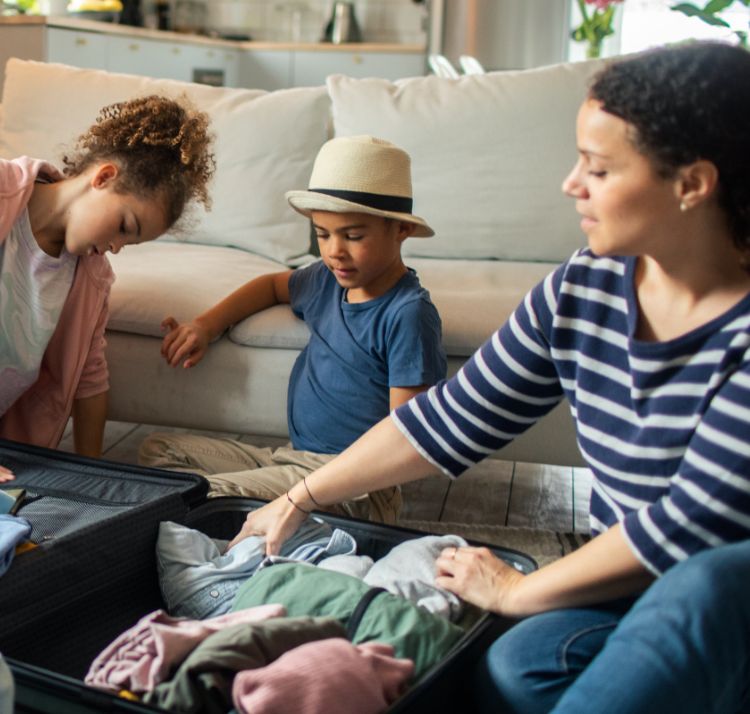
Because you shouldn’t stress about your health when you travel
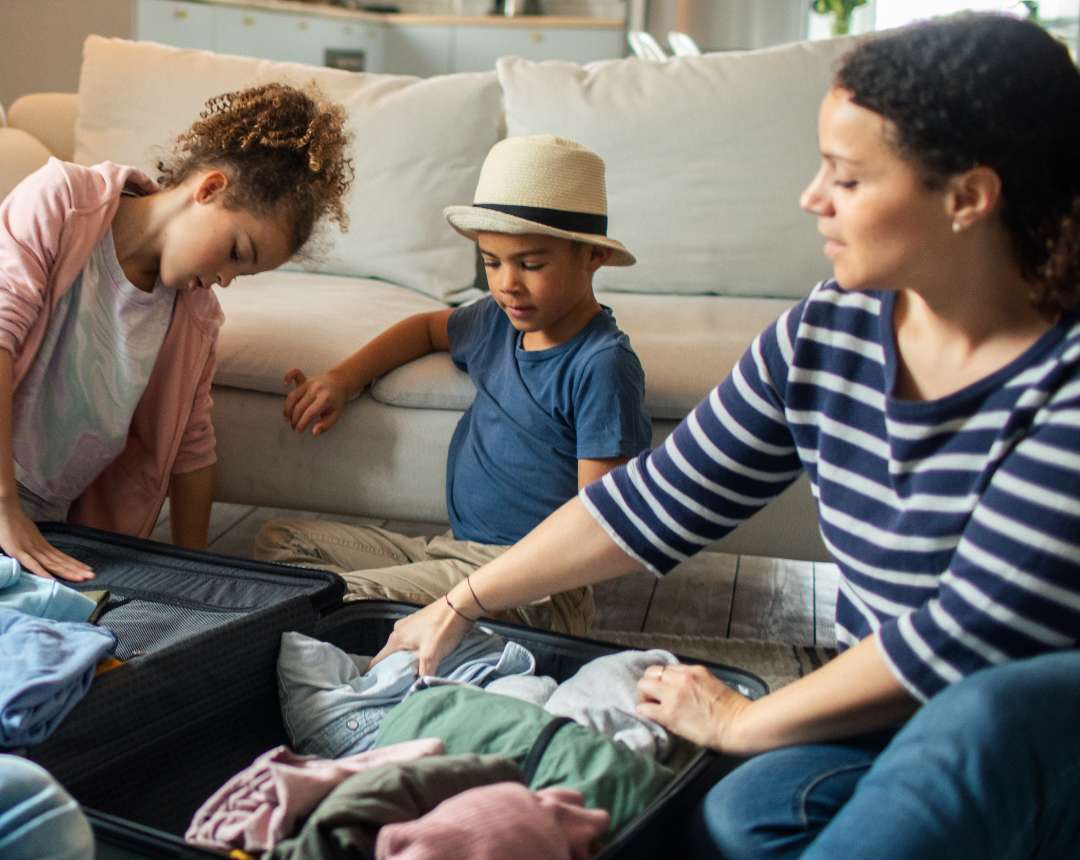
No one wants to get sick on vacation
Stick to your routine no matter where you are.

Making passport renewal easy
Need help with travel medical insurance?
Get up to date.
What vaccines do you need to travel?
The vaccines you need will depend on where you’re traveling and what you will be doing during your travels. Walgreens pharmacists are able to assist in helping you determine which vaccines you may need.
Which travel vaccines are available at Walgreens?
Travel vaccines Walgreens offers include: Yellow Fever, Meningitis, Polio, Typhoid, Japanese Encephalitis, Tick-Borne Encephalitis, Hepatitis A, Hepatitis B and Rabies*.
*Vaccines offered at Walgreens vary by state, age and health conditions. Talk to your local pharmacist about availability.
What other vaccines should I have before traveling?
It’s important to be up-to-date on routine vaccinations before traveling as well—like Measles-Mumps-Rubella (MMR), Tetanus, Flu and COVID-19.
You are leaving Walgreens.com Any information you provide will be subject to GeoBlue’s privacy and security policies.
Essentials you don’t want to be without

- Skip to main content
- Skip to "About this site"
Language selection
Search travel.gc.ca.
Help us to improve our website. Take our survey !
COVID-19: travel health notice for all travellers
India travel advice
Latest updates: Editorial change
Last updated: June 5, 2024 06:24 ET
On this page
Safety and security, entry and exit requirements, laws and culture, natural disasters and climate, india - exercise a high degree of caution.
Exercise a high degree of caution in India due to the threat of terrorist attacks throughout the country.
In and around Bengaluru, Chandigarh and Mumbai - Exercise a high degree of caution
Exercise a high degree of caution in and around Bengaluru, Chandigarh and Mumbai. Consular services in-person are temporarily unavailable in those cities or surrounding areas. If you need consular services, contact the High Commission of Canada in India, located in New Delhi. At any time, you may also contact the Emergency Watch and Response Centre in Ottawa.
Parts of Northeastern India - Avoid non-essential travel
Union territory of jammu and kashmir - avoid all travel.
This advisory excludes travelling to or within the Union Territory of Ladakh.
Border areas with Pakistan - Avoid all travel
This advisory excludes the Wagah border crossing.
Back to top
General elections are scheduled to take place between April 19 and June 1, 2024. Demonstrations could occur before, during and after the elections.
Disruptions to traffic and public transportation may also occur. Curfews may be imposed without notice.
- Avoid areas where demonstrations and large gatherings are taking place
- Follow the instructions of local authorities
- Monitor local media for information on ongoing demonstrations
Mass gatherings (large-scale events)
Security situation
In the context of recent developments in Canada and in India, there are calls for protests and some negative sentiment towards Canada in traditional media and on social media. Demonstrations, including anti-Canada protests, could occur and Canadians may be subjected to intimidation or harassment. In Delhi and the National Capital Region, you should keep a low profile with strangers, and not share your personal information with them. Avoid crowded areas, including public transportation. You should always travel with someone and inform a friend or a family member of your travel plans.
Consular services in person are temporarily unavailable in and around Bengaluru, Chandigarh and Mumbai. Consular services in person at the High Commission of Canada in New Delhi will remain available.
Union Territory of Jammu and Kashmir
The security situation in the Union Territory of Jammu and Kashmir is tense. There are high risks of violent protests, civil unrest and acts of terrorism and militancy.
Violent clashes between militants and security forces occur regularly. Terrorist attacks against security forces have led to civilian casualties. Further attacks could take place at any time. You could find yourself in the wrong place at the wrong time.
The Indian army has enhanced powers in this territory. Authorities may impose curfews and security restrictions on short notice.
- Avoid gatherings and demonstrations
- Always carry ID
- Expect a heightened security presence and security checks
Border areas with Pakistan
The level of tension between India and Pakistan may change suddenly. You could experience difficulties when travelling between the two countries. You may be subject to scrutiny if officials from either country become aware that you have recently travelled to the other.
The security situation along the border with Pakistan, especially along the Line of Control (LoC), which separates the Union territories of Jammu and Kashmir and Ladakh from Pakistan-administered Kashmir, remains volatile. Cross-border gunfire and shelling are occurring sporadically along the LoC. The presence of landmines and unexploded ordnance also constitute a risk.
Although international travellers regularly use the Wagah border crossing linking Amritsar, India, to Lahore, Pakistan, it remains vulnerable to attack. Security measures are in place. You may experience long delays.
Parts of Northeastern India
Several extremist and insurgent groups are active in the northeastern states of Assam and Manipur. They regularly target local government and security forces and may use various criminal activities to finance their activities.
Ethnic tensions in the State can also lead to conflict and civil unrest.
There is a threat of terrorism in India, particularly in:
- the Union territory of Jammu and Kashmir
- the State of Manipur
- the State of Assam
- areas of East India where Naxalites groups are active
Maoist extremist insurgents, known as Naxalites, are responsible for the majority of terrorist attacks in India. These groups are usually based in rural and forested areas within zones of concerns, as defined by the Government of India, which include:
- Andhra Pradesh
- Chhattisgarh
- Madhya Pradesh
- Maharashtra
- Uttar Pradesh
- West Bengal
Extremist and insurgent groups usually target government and security forces, and sometimes, trains and railway tracks. While tourists are not usually specifically targeted, bystanders could be affected. Be particularly vigilant during election periods and in the lead-up to, and during, religious holidays and times of national significance, such as:
- Republic Day (January 26)
- Independence Day (August 15)
Targets of terrorist attacks could include:
- government buildings, including schools
- places of worship
- airports and other transportation hubs and networks
- public areas such as tourist attractions, restaurants, bars, coffee shops, shopping centres, markets, hotels and other sites frequented by foreigners
While in India:
- always be aware of your surroundings when in public places
- if you see a suspicious package, immediately leave the area and report it to authorities
Petty crime, such as pickpocketing and purse snatching, is common. Criminals may target foreigners, especially in major cities and tourist areas.
- Be vigilant in all crowded locations
- Don’t carry large sums of money
- Ensure that your personal belongings, including your passport and other travel documents, are secure at all times
Petty crime frequently occurs on public transportation and overnight trains.
- Ensure that the train compartment contains packages belonging only to you and other occupants
- Store personal belongings in a safe place, and don’t leave the compartment unattended
- Securely lock the doors
Serious crime against foreigners is less frequent, but incidents do occur.
Credit card and ATM fraud occurs. Be cautious when using debit or credit cards:
- pay careful attention when your cards are being handled by others
- use ATMs located in well-lit public areas or inside a bank or business
- avoid using card readers with an irregular or unusual feature
- cover the keypad with one hand when entering your PIN
- check for any unauthorized transactions on your account statements
Exercise caution in tourist areas and airports where scammers particularly target foreigners.
Scams involving the exportation of jewels, gemstones, carpets, and other items have occurred. Taxi drivers may approach you, offering money to export such items.
- Don’t accept any offer, no matter how convincing
- Beware of offers for cheap transportation or accommodation, extended taxi rides and unsolicited guided tours
Romance scams
If you’re travelling to India to meet someone you’ve otherwise only met online, you may be the victim of a scam.
Be alert to attempts at fraud by persons who profess friendship or romantic interest over the internet.
Investment scams
Unsolicited emails offering attractive business or financial opportunities are most likely fraudulent.
Don’t travel to India to obtain restitution after losing money to a scam.
Overseas fraud
Spiked food and drinks
Never leave food or drinks unattended or in the care of strangers. Be wary of accepting snacks, beverages, gum or cigarettes from new acquaintances. These items may contain drugs that could put you at risk of sexual assault and robbery.
Women’s safety
Crimes committed against women frequently occur in India. Foreign women are often the target of unwanted attention.
Staring, verbal abuse, groping, and other forms of sexual harassment can occur anywhere, including in tourist sites and areas. Attackers sometimes act as a group.
Reports of rape and assault against foreign women have increased. You should be particularly vigilant:
- on all forms of public transportation
- at Yoga centres, ashrams and other places of spiritual retreats
Local authorities may not always respond adequately to reports of sexual violence and harassment.
- Avoid travelling alone, particularly at night
- Be extremely vigilant on public transportation, taxis and auto-rickshaws
- Be careful when dealing with strangers or new acquaintances
- Be wary of accepting snacks or beverages from new acquaintances
- Avoid less populous and unlit areas
- Respect local customs and dress codes
- Reach police immediately if you feel threatened
If you are the victim of a sexual assault, you should report it immediately to local authorities and the nearest office of the Government of Canada.
Advice for women travellers
Forced marriages
Forced marriage affecting foreigners occurs, sometimes without the affected person’s prior knowledge or consent.
Some Canadians have been forced into marital arrangements and have been detained against their will. They have been subjected to threats, intimidation and violence by family members.
If you’re in Canada
If you’re in Canada and you believe that you’re being forced to travel overseas to marry, you should call your local police for assistance.
If you’re in India
If you’re in India and you believe that you’re being forced to marry, contact the nearest office of the Government of Canada. You may also contact the Emergency Watch and Response Centre .
Family members may retain passports to prevent victims from returning to Canada. Keep digital or physical copies of your travel documents in a safe place.
General information and advice about forced marriage
Demonstrations and mass gatherings
Protests in manipur.
Violent demonstrations have been taking place in Manipur State since May 3, 2023, resulting in casualties. Protests have led to disruptions to traffic and public transportation. Curfews have been imposed in several districts and mobile and internet services may be limited.
If you are in Manipur:
- monitor local media for the most recent information
- follow the instructions of local authorities
- be prepared to modify your plans in case of disturbances
- expect enhanced security measures and an increased police presence
Demonstrations, mass gatherings, general strikes, “bandh” or “hartal,” take place frequently. Even peaceful demonstrations can turn violent at any time. They can also lead to disruptions to traffic and public transportation.
Stampedes have occurred during mass gatherings, including religious ceremonies, and resulted in deaths and injuries.
Local authorities may impose curfews and other restrictions on short notice.
- Follow the instructions of local authorities, including curfews
Road safety
Road conditions and road safety are poor throughout the country. Most roads, including major highways, are poorly maintained. There is severe traffic congestion. Driving conditions may be hazardous during the rainy season, and some roads can become impassable.
Drivers don’t respect traffic laws. They are often aggressive or reckless. Driving can be hazardous due to the presence of livestock or wandering cows, including in urban areas.
Fatal road accidents are frequent. They can lead to mob anger and assault.
- Avoid travelling outside urban centres after dark
- Avoid driving or riding motorcycles in India, even if you are an experienced motorcyclist
- Be very careful when crossing the street, even at pedestrian crossings
- If involved in an accident, contact local authorities immediately
Public transportation
India has an extensive passenger train system. Rail accidents are common, mostly due to poor maintenance. Thefts are frequent on certain train lines.
If you use a taxi, get it from a reputable hotel, an official taxi stand, or a trusted ride-sharing app. At the airport, use officially marked taxis or pre-paid transport services.
- Negotiate fares in advance, or insist that the driver use the meter, as you may be overcharged
- Avoid travelling alone, especially at night
- Don’t share taxis with strangers
Maritime transportation
Maritime accidents occur regularly due to the overloading and poor maintenance of some vessels.
- Don’t board vessels that appear overloaded or unseaworthy
- Always wear a life jacket
Pirate attacks and armed robbery against ships occur in coastal waters. Mariners should take appropriate precautions.
Live piracy report - International Maritime Bureau
Water activities
Coastal waters can be dangerous. Riptides are common. Several drownings occur each year.
Beaches are not usually supervised by lifeguards. Many beaches don’t display warnings of dangerous conditions.
- Seek local advice before swimming
- Avoid swimming if red flags are flown
- Avoid swimming during Monsoon season
- Always wear a life jacket if you use a boat or a small embarkation
Water safety abroad
No commercial mountain rescue services are operating above 3,000 metres.
If you intend on trekking:
- never do so alone and always hire an experienced guide from a reputable company
- buy travel insurance that includes helicopter rescue and medical evacuation
- ensure that your physical condition is good enough to meet the challenges of your activity
- ensure that you’re adequately equipped and well informed about weather and other conditions that may pose a hazard
- inform a family member or friend of your itinerary, including when you expect to be back to camp
- know the symptoms of acute altitude sickness, which can be fatal
- obtain detailed information on trekking routes or ski slopes before setting out and do not venture off marked trails or slopes
Wildlife viewing
Wildlife viewing may pose risks, particularly on foot or at close range. If you plan on visiting a wildlife area such as a tiger reserve:
- always maintain a safe distance when observing wildlife
- only exit a vehicle when a professional guide or warden says it’s safe to do so
- only use reputable and professional guides or tour operators
- closely follow park regulations and wardens’ advice
Large groups of monkeys are present in several parts of India, including some urban regions. Monkeys can get aggressive and rapidly overwhelm travellers in their search for food. They can also steal your belongings.
Be vigilant when in the presence of monkeys.
We do not make assessments on the compliance of foreign domestic airlines with international safety standards.
Information about foreign domestic airlines
Every country or territory decides who can enter or exit through its borders. The Government of Canada cannot intervene on your behalf if you do not meet your destination’s entry or exit requirements.
We have obtained the information on this page from the Indian authorities. It can, however, change at any time.
Verify this information with the Foreign Representatives in Canada .
Entry requirements vary depending on the type of passport you use for travel.
Before you travel, check with your transportation company about passport requirements. Its rules on passport validity may be more stringent than the country’s entry rules.
Regular Canadian passport
Your passport must be valid for 6 months from your date of entry into India and must contain at least two blank pages for use by immigration officials.
Passport for official travel
Different entry rules may apply.
Official travel
Passport with “X” gender identifier
While the Government of Canada issues passports with an “X” gender identifier, it cannot guarantee your entry or transit through other countries. You might face entry restrictions in countries that do not recognize the “X” gender identifier. Before you leave, check with the closest foreign representative for your destination.
Other travel documents
Different entry rules may apply when travelling with a temporary passport or an emergency travel document. Before you leave, check with the closest foreign representative for your destination.
Useful links
- Foreign Representatives in Canada
- Canadian passports
Certain types of Indian visa services for Canadians have resumed. For additional information, please contact the visa service provider directly.
Latest information – Indian Visa Application Center in Canada
Ensure you apply for the proper type of visa for the specific purpose of your trip. If you are denied entry by immigration officials, you will be returned to your point of departure.
Canadian-Pakistani citizens are subject to different visa application and registration procedures.
You can only stay in India for up to 180 consecutive days on a tourist visa, even when its validity exceeds 180 days.
Residency registration
If you stay in India for more than 180 days, you must register within 14 days of arrival with the Foreigners Regional Registration Office (FRRO).
- e-FRRO online portal (for Delhi, Mumbai, Chennai and Bengaluru) – India's Bureau of Immigration
- FRRO Contact List – India's Bureau of Immigration
Penalties for overstaying
Strict penalties are enforced for overstaying. If you overstay, you could be subject to fines, detention and a future travel ban.
If you have overstayed your visa, you must request an exit visa from the Foreigners Regional Registration Office (FRRO). This process can be lengthy.
Other entry requirements
Customs officials may ask you to show them a return or onward ticket and proof of sufficient funds to cover your stay.
Dual citizenship
If you hold an Overseas Citizens of India (OCI) card, you must present it upon entry and exit.
You must present a boarding pass and a photo identification to access airport departure terminals and public areas.
Lost or stolen passport
If your passport is lost or stolen, an exit visa is required to leave India.
To obtain an exit visa, you must present the FRRO with:
- a police report
- two current passport-size photographs
- a letter providing details of the loss or theft from the High Commission of Canada to India in New Delhi or Consulate General of Canada in either Chandigarh or Mumbai
The FRRO will verify the entry details before issuing an exit visa. This process can take several days.
Restricted and Protected Areas
Special permits are required to visit certain parts of India designated as restricted or protected areas.
Restricted or protected areas – India's Bureau of Immigration
- Poliomyelitis
You may need to produce proof of polio vaccination if you are arriving in India from:
- Afghanistan
- the Democratic Republic of the Congo
Confirm this requirement with the nearest Indian diplomatic office before travelling.
- Foreign Representatives in Canada
- Children and travel
Learn more about travelling with children .
Yellow fever
Learn about potential entry requirements related to yellow fever (vaccines section).
Relevant Travel Health Notices
- Global Measles Notice - 13 March, 2024
- Zika virus: Advice for travellers - 31 August, 2023
- COVID-19 and International Travel - 13 March, 2024
This section contains information on possible health risks and restrictions regularly found or ongoing in the destination. Follow this advice to lower your risk of becoming ill while travelling. Not all risks are listed below.
Consult a health care professional or visit a travel health clinic preferably 6 weeks before you travel to get personalized health advice and recommendations.
Routine vaccines
Be sure that your routine vaccinations , as per your province or territory , are up-to-date before travelling, regardless of your destination.
Some of these vaccinations include measles-mumps-rubella (MMR), diphtheria, tetanus, pertussis, polio, varicella (chickenpox), influenza and others.
Pre-travel vaccines and medications
You may be at risk for preventable diseases while travelling in this destination. Talk to a travel health professional about which medications or vaccines may be right for you, based on your destination and itinerary.
Yellow fever is a disease caused by a flavivirus from the bite of an infected mosquito.
Travellers get vaccinated either because it is required to enter a country or because it is recommended for their protection.
- There is no risk of yellow fever in this country.
Country Entry Requirement*
- Proof of vaccination is required if you are coming from or have transited through an airport of a country where yellow fever occurs.
Recommendation
- Vaccination is not recommended.
- Discuss travel plans, activities, and destinations with a health care professional.
- Contact a designated Yellow Fever Vaccination Centre well in advance of your trip to arrange for vaccination.
About Yellow Fever
Yellow Fever Vaccination Centres in Canada * It is important to note that country entry requirements may not reflect your risk of yellow fever at your destination. It is recommended that you contact the nearest diplomatic or consular office of the destination(s) you will be visiting to verify any additional entry requirements.
There is a risk of hepatitis A in this destination. It is a disease of the liver. People can get hepatitis A if they ingest contaminated food or water, eat foods prepared by an infectious person, or if they have close physical contact (such as oral-anal sex) with an infectious person, although casual contact among people does not spread the virus.
Practise safe food and water precautions and wash your hands often. Vaccination is recommended for all travellers to areas where hepatitis A is present.
Measles is a highly contagious viral disease. It can spread quickly from person to person by direct contact and through droplets in the air.
Anyone who is not protected against measles is at risk of being infected with it when travelling internationally.
Regardless of where you are going, talk to a health care professional before travelling to make sure you are fully protected against measles.
Japanese encephalitis is a viral infection that can cause swelling of the brain. It is spread to humans through the bite of an infected mosquito. Risk is very low for most travellers. Travellers at relatively higher risk may want to consider vaccination for JE prior to travelling.
Travellers are at higher risk if they will be:
- travelling long term (e.g. more than 30 days)
- making multiple trips to endemic areas
- staying for extended periods in rural areas
- visiting an area suffering a JE outbreak
- engaging in activities involving high contact with mosquitos (e.g., entomologists)
Hepatitis B is a risk in every destination. It is a viral liver disease that is easily transmitted from one person to another through exposure to blood and body fluids containing the hepatitis B virus. Travellers who may be exposed to blood or other bodily fluids (e.g., through sexual contact, medical treatment, sharing needles, tattooing, acupuncture or occupational exposure) are at higher risk of getting hepatitis B.
Hepatitis B vaccination is recommended for all travellers. Prevent hepatitis B infection by practicing safe sex, only using new and sterile drug equipment, and only getting tattoos and piercings in settings that follow public health regulations and standards.
Coronavirus disease (COVID-19) is an infectious viral disease. It can spread from person to person by direct contact and through droplets in the air.
It is recommended that all eligible travellers complete a COVID-19 vaccine series along with any additional recommended doses in Canada before travelling. Evidence shows that vaccines are very effective at preventing severe illness, hospitalization and death from COVID-19. While vaccination provides better protection against serious illness, you may still be at risk of infection from the virus that causes COVID-19. Anyone who has not completed a vaccine series is at increased risk of being infected with the virus that causes COVID-19 and is at greater risk for severe disease when travelling internationally.
Before travelling, verify your destination’s COVID-19 vaccination entry/exit requirements. Regardless of where you are going, talk to a health care professional before travelling to make sure you are adequately protected against COVID-19.
The best way to protect yourself from seasonal influenza (flu) is to get vaccinated every year. Get the flu shot at least 2 weeks before travelling.
The flu occurs worldwide.
- In the Northern Hemisphere, the flu season usually runs from November to April.
- In the Southern Hemisphere, the flu season usually runs between April and October.
- In the tropics, there is flu activity year round.
The flu vaccine available in one hemisphere may only offer partial protection against the flu in the other hemisphere.
The flu virus spreads from person to person when they cough or sneeze or by touching objects and surfaces that have been contaminated with the virus. Clean your hands often and wear a mask if you have a fever or respiratory symptoms.
Typhoid is a bacterial infection spread by contaminated food or water. Travellers going to countries in South Asia should speak to a health care professional about getting vaccinated.
Malaria is a serious and sometimes fatal disease that is caused by parasites spread through the bites of mosquitoes. There is a risk of malaria in certain areas and/or during a certain time of year in this destination.
Antimalarial medication may be recommended depending on your itinerary and the time of year you are travelling. Consult a health care professional or visit a travel health clinic before travelling to discuss your options. It is recommended to do this 6 weeks before travel, however, it is still a good idea any time before leaving. Protect yourself from mosquito bites at all times: • Cover your skin and use an approved insect repellent on uncovered skin. • Exclude mosquitoes from your living area with screening and/or closed, well-sealed doors and windows. • Use insecticide-treated bed nets if mosquitoes cannot be excluded from your living area. • Wear permethrin-treated clothing. If you develop symptoms similar to malaria when you are travelling or up to a year after you return home, see a health care professional immediately. Tell them where you have been travelling or living.
In this destination, rabies is carried by dogs and some wildlife, including bats. Rabies is a deadly disease that spreads to humans primarily through bites or scratches from an infected animal. While travelling, take precautions , including keeping your distance from animals (including free-roaming dogs), and closely supervising children.
If you are bitten or scratched by an animal while travelling, immediately wash the wound with soap and clean water and see a health care professional. Rabies treatment is often available in this destination.
Before travel, discuss rabies vaccination with a health care professional. It may be recommended for travellers who are at high risk of exposure (e.g., occupational risk such as veterinarians and wildlife workers, children, adventure travellers and spelunkers, and others in close contact with animals).
Safe food and water precautions
Many illnesses can be caused by eating food or drinking beverages contaminated by bacteria, parasites, toxins, or viruses, or by swimming or bathing in contaminated water.
- Learn more about food and water precautions to take to avoid getting sick by visiting our eat and drink safely abroad page. Remember: Boil it, cook it, peel it, or leave it!
- Avoid getting water into your eyes, mouth or nose when swimming or participating in activities in freshwater (streams, canals, lakes), particularly after flooding or heavy rain. Water may look clean but could still be polluted or contaminated.
- Avoid inhaling or swallowing water while bathing, showering, or swimming in pools or hot tubs.
Cholera is a risk in parts of this country. Most travellers are at very low risk.
To protect against cholera, all travellers should practise safe food and water precautions .
Travellers at higher risk of getting cholera include those:
- visiting, working or living in areas with limited access to safe food, water and proper sanitation
- visiting areas where outbreaks are occurring
Vaccination may be recommended for high-risk travellers, and should be discussed with a health care professional.
Travellers' diarrhea is the most common illness affecting travellers. It is spread from eating or drinking contaminated food or water.
Risk of developing travellers' diarrhea increases when travelling in regions with poor standards of hygiene and sanitation. Practise safe food and water precautions.
The most important treatment for travellers' diarrhea is rehydration (drinking lots of fluids). Carry oral rehydration salts when travelling.
Typhoid is a bacterial infection spread by contaminated food or water. Risk is higher among children, travellers going to rural areas, travellers visiting friends and relatives or those travelling for a long period of time.
Travellers visiting regions with a risk of typhoid, especially those exposed to places with poor sanitation, should speak to a health care professional about vaccination.
Insect bite prevention
Many diseases are spread by the bites of infected insects such as mosquitoes, ticks, fleas or flies. When travelling to areas where infected insects may be present:
- Use insect repellent (bug spray) on exposed skin
- Cover up with light-coloured, loose clothes made of tightly woven materials such as nylon or polyester
- Minimize exposure to insects
- Use mosquito netting when sleeping outdoors or in buildings that are not fully enclosed
To learn more about how you can reduce your risk of infection and disease caused by bites, both at home and abroad, visit our insect bite prevention page.
Find out what types of insects are present where you’re travelling, when they’re most active, and the symptoms of the diseases they spread.
There is a risk of chikungunya in this country. The risk may vary between regions of a country. Chikungunya is a virus spread through the bite of an infected mosquito. Chikungunya can cause a viral disease that typically causes fever and pain in the joints. In some cases, the joint pain can be severe and last for months or years.
Protect yourself from mosquito bites at all times. There is no vaccine available for chikungunya.
Crimean-Congo haemorrhagic fever is a viral disease that can cause fever, pain and bleeding under the skin. In some cases, it can be fatal. It spreads to humans through contact with infected animal blood or tissues, or from the bite of an infected tick. Risk is generally low for most travellers. Protect yourself from tick bites and avoid animals, particularly livestock. There is no vaccine available for Crimean-Congo haemorrhagic fever.
Visceral leishmaniasis (or kala azar) affects the bone marrow and internal organs. It is caused by a parasite spread through the bite of a female sandfly. It can also be transmitted by blood transfusion or sharing contaminated needles. If left untreated it can cause death. Risk is generally low for most travellers. Protect yourself from sandfly bites, which typically occur after sunset in rural and forested areas and in some urban centres. There is no vaccine or medication to protect against leishmaniasis.
Lymphatic filariasis , also known as elephantiasis, is caused by filariae (tiny worms) spread to humans through the bite of an infected mosquito. It can cause a range of illnesses. Risk is generally low for most travellers. Protect yourself from mosquito bites. There is no vaccine available for lymphatic filariasis although drug treatments exist.
- In this country, dengue is a risk to travellers. It is a viral disease spread to humans by mosquito bites.
- Dengue can cause flu-like symptoms. In some cases, it can lead to severe dengue, which can be fatal.
- The level of risk of dengue changes seasonally, and varies from year to year. The level of risk also varies between regions in a country and can depend on the elevation in the region.
- Mosquitoes carrying dengue typically bite during the daytime, particularly around sunrise and sunset.
- Protect yourself from mosquito bites . There is no vaccine or medication that protects against dengue.
Zika virus is a risk in this country.
Zika virus is primarily spread through the bite of an infected mosquito. It can also be sexually transmitted. Zika virus can cause serious birth defects.
During your trip:
- Prevent mosquito bites at all times.
- Use condoms correctly or avoid sexual contact, particularly if you are pregnant.
If you are pregnant or planning a pregnancy, you should discuss the potential risks of travelling to this destination with your health care provider. You may choose to avoid or postpone travel.
For more information, see Zika virus: Pregnant or planning a pregnancy.
Animal precautions
Some infections, such as rabies and influenza, can be shared between humans and animals. Certain types of activities may increase your chance of contact with animals, such as travelling in rural or forested areas, camping, hiking, and visiting wet markets (places where live animals are slaughtered and sold) or caves.
Travellers are cautioned to avoid contact with animals, including dogs, livestock (pigs, cows), monkeys, snakes, rodents, birds, and bats, and to avoid eating undercooked wild game.
Closely supervise children, as they are more likely to come in contact with animals.
There is a risk of Nipah virus infection in this country. Nipah virus infections can range from asymptomatic (no symptoms) to severe illness and death.
Nipah virus is spread to people from animals (such as fruit bats) but it can also be spread through contaminated food or close contact with someone who is ill.
Travellers to areas where Nipah virus is found should:
- avoid consuming date palm sap products, including raw date palm juice
- thoroughly wash and peel fruit before consumption
- wash hands regularly with soap and water
- discard fruit with signs of bites or fruit that has been found on the ground
- avoid contact with fruit bats and areas where they are known to roost
For more information on preventing Nipah virus infection, visit Nipah virus: Prevention and risks .
There is no vaccine or medication that protects against Nipah virus infection.
Human cases of avian influenza have been reported in this destination. Avian influenza is a viral infection that can spread quickly and easily among birds and in rare cases it can infect mammals, including people. The risk is low for most travellers.
Avoid contact with birds, including wild, farm, and backyard birds (alive or dead) and surfaces that may have bird droppings on them. Ensure all poultry dishes, including eggs and wild game, are properly cooked.
Travellers with a higher risk of exposure include those:
- visiting live bird/animal markets or poultry farms
- working with poultry (such as chickens, turkeys, domestic ducks)
- hunting, de-feathering, field dressing and butchering wild birds and wild mammals
- working with wild birds for activities such as research, conservation, or rehabilitation
- working with wild mammals, especially those that eat wild birds (e.g., foxes)
All eligible people are encouraged to get the seasonal influenza shot, which will protect them against human influenza viruses. While the seasonal influenza shot does not prevent infection with avian influenza, it can reduce the chance of getting sick with human and avian influenza viruses at the same time.
Person-to-person infections
Stay home if you’re sick and practise proper cough and sneeze etiquette , which includes coughing or sneezing into a tissue or the bend of your arm, not your hand. Reduce your risk of colds, the flu and other illnesses by:
- washing your hands often
- avoiding or limiting the amount of time spent in closed spaces, crowded places, or at large-scale events (concerts, sporting events, rallies)
- avoiding close physical contact with people who may be showing symptoms of illness
Sexually transmitted infections (STIs) , HIV , and mpox are spread through blood and bodily fluids; use condoms, practise safe sex, and limit your number of sexual partners. Check with your local public health authority pre-travel to determine your eligibility for mpox vaccine.
Tuberculosis is an infection caused by bacteria and usually affects the lungs.
For most travellers the risk of tuberculosis is low.
Travellers who may be at high risk while travelling in regions with risk of tuberculosis should discuss pre- and post-travel options with a health care professional.
High-risk travellers include those visiting or working in prisons, refugee camps, homeless shelters, or hospitals, or travellers visiting friends and relatives.
Medical services and facilities
The quality of health care varies significantly throughout the country.
Medical care in major cities may be good, but it’s usually very limited or unavailable in rural areas.
Government hospitals provide free services or at a minimal cost. Private facilities often offer a higher level of care but can be expensive. Most hospitals require up-front payment or confirmation of insurance coverage before commencing treatment.
Specialised treatment for psychiatric illness may not be available outside major cities.
Make sure you get travel insurance that includes coverage for medical evacuation and hospital stays.
Travel health and safety
Ambulances are often equipped with basic and old medical equipment.
Response times can be very slow. Traffic doesn’t yield to emergency vehicles.
In case of serious illness or injury, you may consider taking a taxi or private vehicle to go to the hospital rather than wait for an ambulance.
Medical tourism
Some Canadian citizens have had severe health complications following cosmetic or other elective surgeries abroad.
Before leaving for medical travel:
- make sure you have done your research
- use competent health-care providers only
Receiving Medical Care in Other Countries
Keep in Mind...
The decision to travel is the sole responsibility of the traveller. The traveller is also responsible for his or her own personal safety.
Be prepared. Do not expect medical services to be the same as in Canada. Pack a travel health kit , especially if you will be travelling away from major city centres.
You must abide by local laws.
Learn about what you should do and how we can help if you are arrested or detained abroad .
Penalties for possession, use or trafficking of illegal drugs are severe. Convicted offenders can expect heavy fines and jail sentences. Detention during the investigation is common and can be lengthy.
Laws regarding the purchase and consumption of alcohol, including the legal drinking age, differ from state to state. Authorities often call for dry periods during:
- religious festivals
- national holidays
Drugs, alcohol and travel
It is prohibited to import, possess or use e-cigarettes, vaporisers and their refills.
Beef consumption
Cows are protected and venerated by several groups of faith in India.
Several states impose prohibitions on beef slaughter and consumption. In some rural areas, cow protection vigilantes have attacked people suspected of selling, consuming, or possessing beef or items made with cowhide.
Avoid consuming beef or its derived products while in India.
Religious proselytism
In certain states, it’s illegal to engage in religious proselytism, such as preaching, possessing, or distributing religious literature or material with the intent of converting. Indian authorities require foreign missionaries to obtain a missionary visa.
If you plan to conduct religious activities in India, ensure that:
- the activities are legal
- you possess the proper visa for the activities you plan to perform
Satellite devices
It’s illegal to carry or use a satellite device in India.

Photography
It is prohibited to take pictures of military installations, airports and dams.
Ask permission before photographing places of worship such as temples or mosques.
Imports and exports
There are strict regulations on the importation or exportation of items such as:
- antiquities
- electronic equipment
- local currency
- ivory and gold objects
- protected animals
- pornographic material
Among others, you must register antique items for export with local police, with a photograph of each item.
Customs Guide for Travellers - India’s Central Board of Excise and Customs
Dress and behaviour
India is a traditional, conservative and multi-faith society. To avoid offending local sensitivities:
- Dress conservatively
- Behave discreetly
- Respect religious and social traditions
- Avoid displays of affection in public
- Avoid using footwear in places of worship
Indian family law is very different from Canadian law.
In case of dispute, consult a local lawyer to be fully aware of local laws regarding marital fraud, dowry abuse or extortion, custody, guardianship and visitation rights. Individuals facing charges may be forced to remain in India until their cases have been settled or charges dismissed.
Commercial surrogacy
If you’re planning to visit India to commission surrogacy arrangements, you should consider the potential challenges involved in pursuing international surrogacy. Seek specialist legal advice on Indian and Canadian laws before making any arrangements.
A proposed Indian government ban on foreign commercial surrogacy could affect Canadians travelling to India to enter into a surrogacy agreement.
You should also consult with Immigration, Refugees and Citizenship Canada (IRCC) on current policies regarding citizenship through descent and the issuance of Canadian travel documents.
Land and property disputes
If you plan on buying property or are involved in a land dispute in India, you should seek legal advice. Do so before making commitments. Related disputes could take time and be costly to resolve.
The offices of the Government of Canada in India can’t provide assistance or legal advice related to private legal matters.
2SLGBTQI+ travellers
Indian law doesn’t criminalize sexual acts or relationships between persons of the same sex.
However, 2SLGBTQI+ travellers could be discriminated against based on their sexual orientation, gender identity, gender expression, or sex characteristics.
Travel and your sexual orientation, gender identity, gender expression and sex characteristics
Dual citizenship is not legally recognized in India.
If local authorities consider you a citizen of India, they may refuse to grant you access to Canadian consular services. This will prevent us from providing you with those services.
Travellers with dual citizenship
International Child Abduction
The Hague Convention on the Civil Aspects of International Child Abduction is an international treaty. It can help parents with the return of children who have been removed to or retained in certain countries in violation of custody rights. It does not apply between Canada and India.
If your child was wrongfully taken to, or is being held in India by an abducting parent:
- act as quickly as you can
- consult a lawyer in Canada and in India to explore all the legal options for the return of your child
- report the situation to the nearest Canadian government office abroad or to the Vulnerable Children's Consular Unit at Global Affairs Canada by calling the Emergency Watch and Response Centre
If your child was removed from a country other than Canada, consult a lawyer to determine if The Hague Convention applies.
Be aware that Canadian consular officials cannot interfere in private legal matters or in another country's judicial affairs.
- International Child Abductions: A guide for affected parents
- Canadian embassies and consulates by destination
- Request emergency assistance
Identification
You must carry your passport and Indian visa at all times.
Traffic drives on the left.
You must carry an international driving permit.
International Driving Permit
The currency in India is the Indian Rupee (INR).
Non-residents are prohibited from importing or exporting the Indian rupee. A limit of 25,000 rupees is imposed on residents.
Upon entering or leaving India, you must make a declaration to customs if you have USD 5,000 or more, or the equivalent in other currencies.
India is prone to extreme weather events such as:
- dust storms
- earthquakes
Extreme temperatures can occur in both spring and summer.
The rainy (or monsoon) season extends from June to September.
Heavy rain can cause flooding throughout the country, resulting in significant loss of life and extensive damage to infrastructure. Seasonal flooding and landslides can hamper overland travel and reduce the provision of essential services. Roads may become impassable and bridges damaged.
India’s coastline is subject to cyclones, particularly between April and December. These severe storms can put you at risk and hamper the provision of essential services.
If you decide to travel to a coastal area:
- know that you may expose yourself to serious safety risks
- be prepared to change your travel plans on short notice, including cutting short or cancelling your trip
- stay informed of the latest regional weather forecasts
- carry emergency contact information for your airline or tour operator
- follow the advice and instructions of local authorities
- Tornadoes, cyclones, hurricanes, typhoons and monsoons
- Large-scale emergencies abroad
- Weather forecasts and warnings - Indian Meteorological Department
- Current cyclone activity - Tropical storm risk
Seismic activity
Parts of India are located in active seismic zones. Earthquakes occur.
In the event of an earthquake, follow the instructions of local authorities.
What to do during an earthquake
Air pollution
Smoke haze and other types of air pollution can be extremely hazardous in urban areas and cities such as Delhi. It’s typically at its worst in winter. In rural areas, air quality can be affected by agricultural burning.
Dust storms also occur across northern India.
Monitor air pollution levels, which change quickly, especially if you suffer from respiratory ailments or have pre-existing medical conditions.
During periods of high pollution:
- limit your activities outdoors
- monitor local media
- System of Air Quality Weather Forecasting and Research - Ministry of Earth Science of India
- Real time ambient air quality data - Delhi Pollution Control Committee
- Air pollution in India - World Air Quality Index
In mountainous regions, avalanches present a risk and have resulted in fatalities.
- Monitor local media and weather forecasts
- Follow the advice of local authorities
Local services
In case of emergency, dial:
- police: 100/112 from cellular telephones
- firefighters: 101
- medical assistance: 102
- victims of sexual harassment: 1091
General services
The Indian Ministry of Tourism offers 24-hour general advice for tourists.
Dial: 1-800 111-363.
Consular assistance
The Consulates General of Canada in Bengaluru, Chandigarh and Mumbai are temporarily suspending in-person operations. You can obtain consular assistance and further consular information from the High Commission of Canada in New Delhi.
Consular services in person remain available at the High Commission of Canada in New Delhi.
Andaman and Nicobar Islands, Andhra Pradesh, Arunachal Pradesh, Assam, Bihar, Chandigarh, Chhattisgarh, Dadra and Nagar Haveli, Daman and Diu, Delhi, Goa, Gujarat, Haryana, Himachal Pradesh, Jammu and Kashmir, Jharkhand, Karnataka, Kerala, Ladakh, Lakshadweep, Madhya Pradesh, Maharashtra, Manipur, Meghalaya, Mizoram, Nagaland, Odisha, Pondicherry, Punjab, Rajasthan, Sikkim, Tamil Nadu, Telangana, Tripura, Uttar Pradesh, and Uttarakhand.
For emergency consular assistance, call the High Commission of Canada in India, in New Delhi and follow the instructions. At any time, you may also contact the Emergency Watch and Response Centre in Ottawa.
The decision to travel is your choice and you are responsible for your personal safety abroad. We take the safety and security of Canadians abroad very seriously and provide credible and timely information in our Travel Advice to enable you to make well-informed decisions regarding your travel abroad.
The content on this page is provided for information only. While we make every effort to give you correct information, it is provided on an "as is" basis without warranty of any kind, expressed or implied. The Government of Canada does not assume responsibility and will not be liable for any damages in connection to the information provided.
If you need consular assistance while abroad, we will make every effort to help you. However, there may be constraints that will limit the ability of the Government of Canada to provide services.
Learn more about consular services .
Risk Levels
take normal security precautions.
Take similar precautions to those you would take in Canada.
Exercise a high degree of caution
There are certain safety and security concerns or the situation could change quickly. Be very cautious at all times, monitor local media and follow the instructions of local authorities.
IMPORTANT: The two levels below are official Government of Canada Travel Advisories and are issued when the safety and security of Canadians travelling or living in the country or region may be at risk.
Avoid non-essential travel
Your safety and security could be at risk. You should think about your need to travel to this country, territory or region based on family or business requirements, knowledge of or familiarity with the region, and other factors. If you are already there, think about whether you really need to be there. If you do not need to be there, you should think about leaving.
Avoid all travel
You should not travel to this country, territory or region. Your personal safety and security are at great risk. If you are already there, you should think about leaving if it is safe to do so.
22 things you need to know before visiting India

Dec 15, 2023 • 14 min read
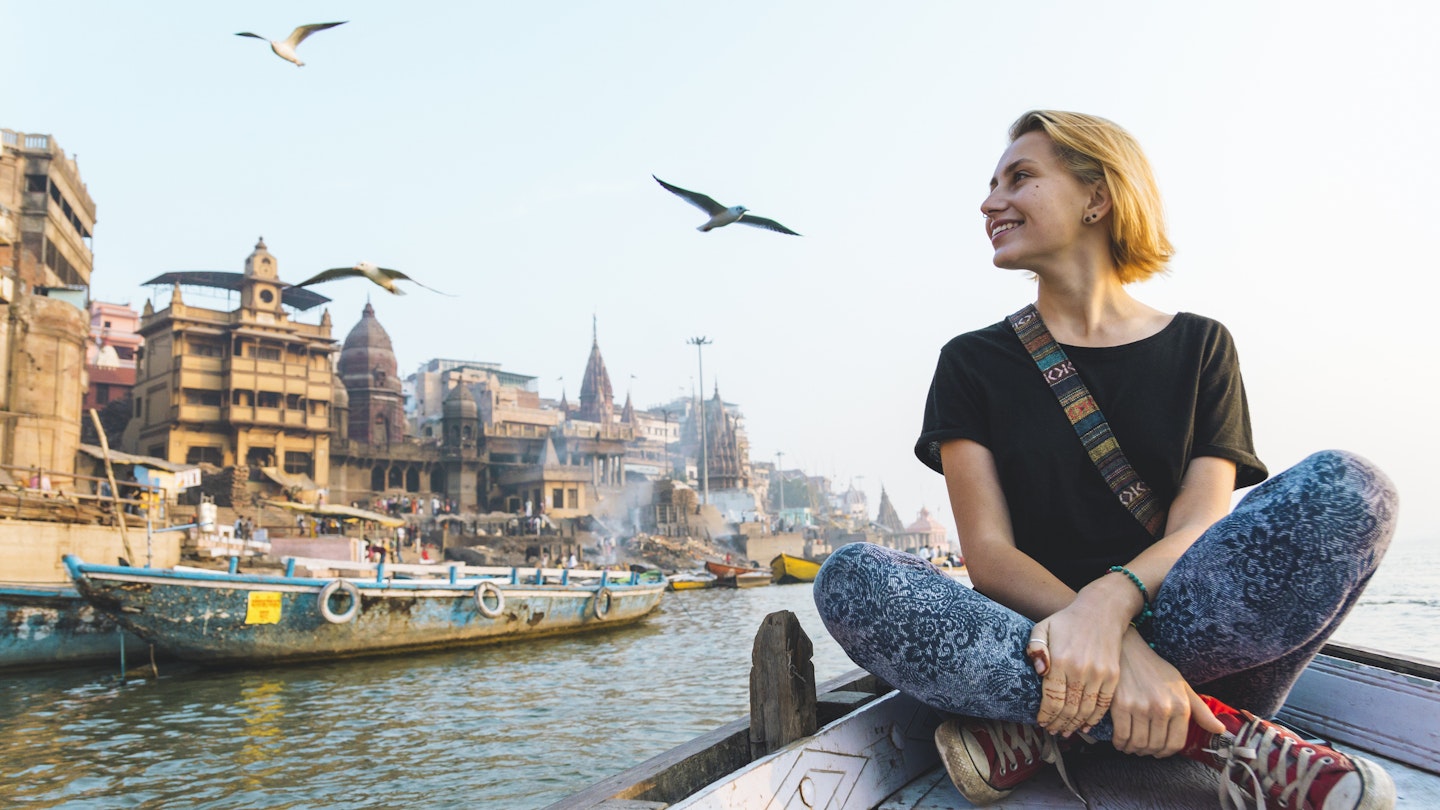
India is a feast for the senses and we've got everything you need to know before you visit © Andrii Lutsyk / Ascent Xmedia / Getty Images
India is a place that overwhelms your senses in the best possible way – nowhere else delivers quite the same barrage of sights, sounds and sensations as this continent-sized country at the heart of Asia.
It would take a lifetime to see all of India , let alone understand every nuance and facet of this nation of 1.4 billion inhabitants. But with a little preparation, you can learn to navigate the richness of this country, from its snow-capped peaks and velvety beaches to its historic temples and luxuriant palaces.
We've collated the top things you need to know about visiting India, but the journey begins before you leave home. Apply for your Indian visa online for a smooth arrival on the subcontinent. Read on for 22 more insider tips that will help make your vacation unforgettable.
1. Plan your trip around the seasons
India has a reputation for being hot and humid, but with beaches, mountains, hills, coastlines and plains all jammed into a relatively small geographical area, the climate is quite diverse. The southwest monsoon brings rainy weather to most of the country from June to September, but this is the best time of year to visit the high-altitude deserts of Ladakh , although depending on the route you take, you risk encountering landslides and floods.
In the far south, there’s also a milder rainy season from October to December. The ideal weather window for travel is from October to May, though temperatures and humidity climb to agonizing levels from March onwards in the run-up to the monsoon. If you find yourself in India in the spring, head to the Himalayan foothills for milder temperatures and good trekking conditions.
2. Get your jabs before you travel
There is no official requirement for vaccinations to enter India (although yellow fever vaccination is needed if you are traveling from a country where the disease is endemic).
That said, it is important that you contact a health professional at least eight weeks before you travel to ensure your jabs are up to date. Vaccinations for diphtheria and tetanus, hepatitis A and B, polio and typhoid are usually recommended, on top of childhood vaccinations for measles, mumps, rubella and varicella.
Vaccinations worth considering for longer trips include Japanese B encephalitis, meningitis and rabies. Monkeys, dogs and cats can all carry the rabies parasite, and infection is fatal if untreated.
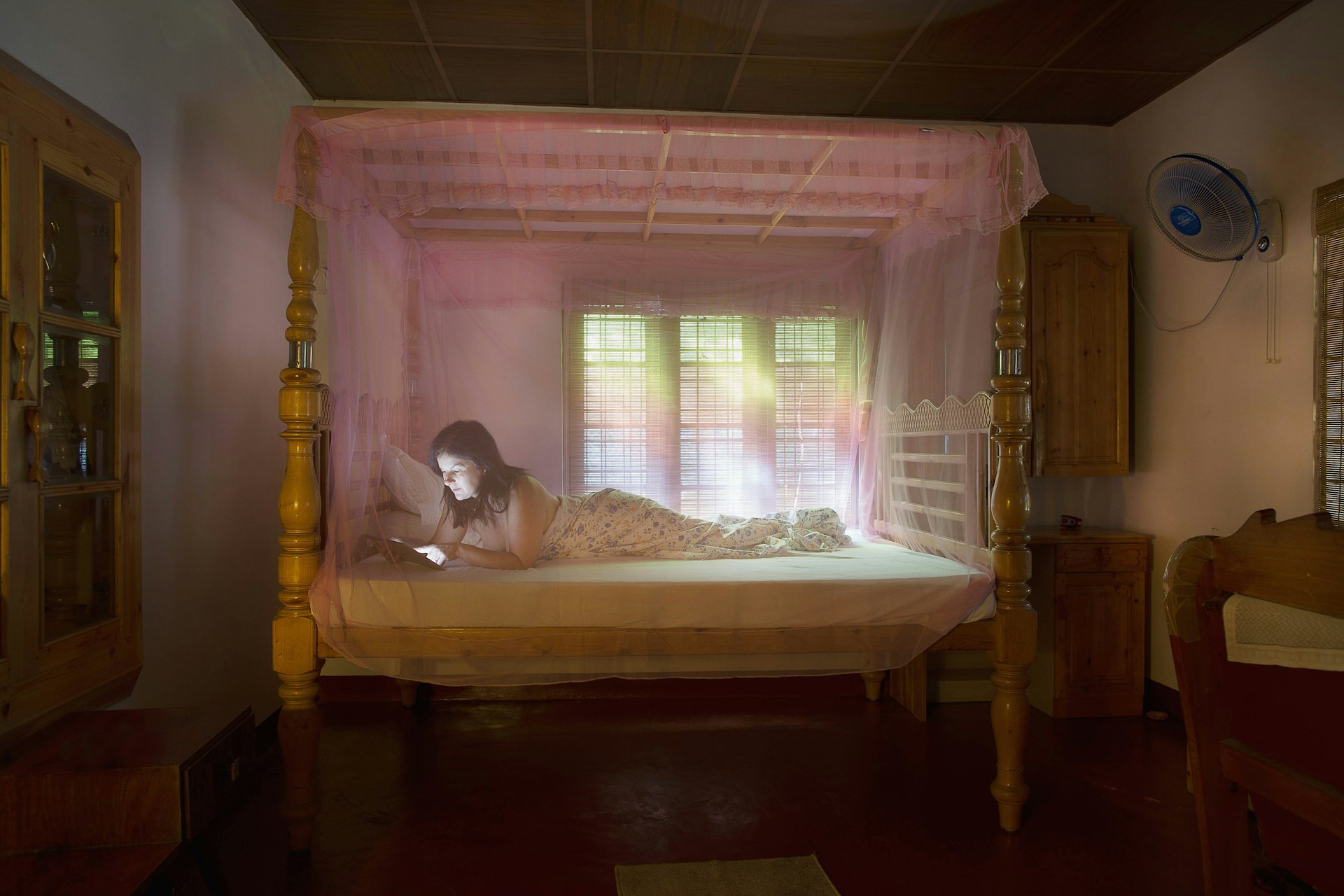
3. Take malaria precautions
Depending on where in India you are traveling to, you may want to speak to your healthcare provider about taking a course of anti-malarial tablets. For instance, northeastern and eastern parts of India, as well as the city of Mangalore, have a higher malaria risk.
Always take precautions to avoid mosquito bites – this will also help you avoid dengue fever, a viral infection that is transmitted by mosquitoes to humans. Sleeping under a mosquito net, wearing long sleeves and trousers in light colors, and using a repellent and/or a plug-in mosquito killer with a high concentration of DEET (diethyltoluamide) is advisable.
4. Get insured
Travel insurance is essential for India. Depending on where you travel to, you may find public hospitals are poorly equipped. Additionally, most private clinics and hospitals require payment ahead of treatment. Make sure you are covered for emergency evacuation and also for any adventure activities you plan to get involved in.
If you’re unlucky enough to be a victim of crime, contact the local police station or dial 100 or 112, the national emergency number. You’ll need to get the police to file a report (a “FIR" – First Information Report) to make a claim on your travel insurance.
5. Book ahead for busy times and festivals
India can get very busy from November to February, so affordable accommodation is usually swamped in peak season. It’s a good idea to book ahead, either directly with the venues or via booking aggregator sites such as Agoda and MakeMyTrip .
Also, book train tickets in advance where possible , particularly for popular routes. Tickets can be booked (with a fair amount of hassle) via the government booking site IRCTC or more easily through local booking sites such as 12Go or Cleartrip .
6. Plan your comms before you travel
Many things in India (including train bookings or ordering food online) get easier if you have a local SIM card. Bring an unlocked phone from home (or pick one up locally) and get a phone shop to sign you up for a local pay-as-you-go SIM package on arrival. You’ll need to bring passport photos and photocopies of your passport ID pages to complete the application.
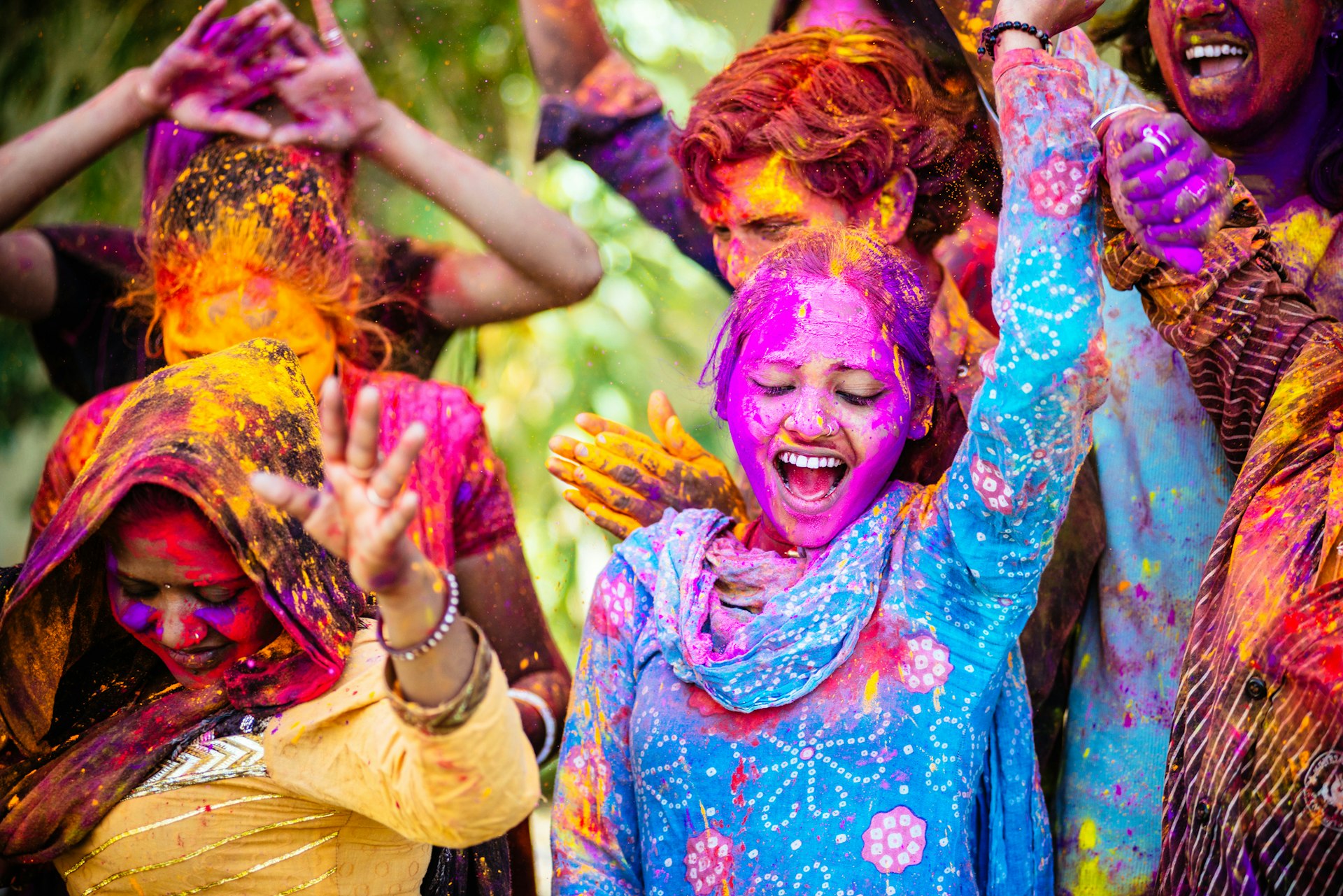
7. Check your lunar calendars
While India officially follows the Gregorian calendar, the major festivals for Hinduism, Buddhism, Jainism, Islam and several other religions follow lunar calendars and fall on different dates from year to year. Always check festival dates before you book your trip (bearing in mind these dates are subject to change); the Indian government maintains a useful online list of public holidays .
8. Learn local etiquette
English is the lingua franca in most metropolitan areas in India, and you’ll get away with polite hellos, goodbyes and thank yous in smaller towns too. However, if you’re traveling in northern India, you can say "namaste" (I bow to you) with your hands together in a prayer-like gesture in front of your chest. Similarly, when meeting Muslims in north India, you can say "salaam alaikum" (peace be with you) – the correct response is "alaikum salaam." Most of the time, it’s the effort that’s welcomed over pronunciation, so don’t be shy!
Shaking hands is a standard business greeting between men, but outside metropolitan regions, men and women rarely shake. Only ever use your right hand. The same rule applies when passing things to people – including money.
If you get invited to someone’s home, bring a small gift (flowers or sweets are always a safe bet) and remove your shoes before entering. It’s polite to eat and drink what you are offered, even if you don’t really fancy it.
9. Dress modestly
Depending on where in India you are, modesty is taken seriously – especially for women. Travelers of any gender will have an easier time if they wear loose-fitting clothing that covers their legs and arms. Swimwear is only appropriate for the beach – although it is not uncommon to see locals swim fully clothed. To fit in, consider investing in a kurta pyjama (a traditional garment resembling a long shirt and loose trousers for men) or a salwar kameez (a long shirt, loose trousers and scarf for women).
10. What to eat and how to eat it
Many religions in India have their own dietary rules. Muslims avoid pork, many Hindus avoid beef, and some Hindus and Buddhists are vegetarian or vegan. Many Jains are vegetarians who avoid some vegetables (most notably onions, garlic and potatoes) and who try to avoid causing harm to all living creatures. These rules mean vegan and vegetarian food is often easy to find in India.
Eating with your hands is the norm in many restaurants, particularly in parts of southern India. Take your cue from other patrons in the restaurant, and remember to eat with your right hand. Mix rice and curry into balls with your fingers and push it into your mouth with your thumb. Some thalis (plate meals consisting of multiple dishes served in tandem) are served not on a plate but on a washed and flash-heated banana leaf.
11. Haggling is not a game of life and death
Haggling for a fair price when buying things – in street stalls and open-air markets – is a way of life in India. Although it can sometimes be a frustrating experience, losing your temper is extremely bad form – if you can’t agree on a price with the vendor that you are both happy with, politely decline and shop somewhere else.
The rules of the game are as follows. The vendor will quote you a price that is more than the item is worth, then you’ll come back with a counter-offer, working up from there until you reach a mutually agreeable figure.
The “walking away” trick may bring a few last-minute adjustments, but before long, you’ll reach a threshold that the vendor won’t go below. Throwing in extra items may bring a discount on the overall cost. Many travelers prefer not to haggle in places where the money goes directly to artisans.
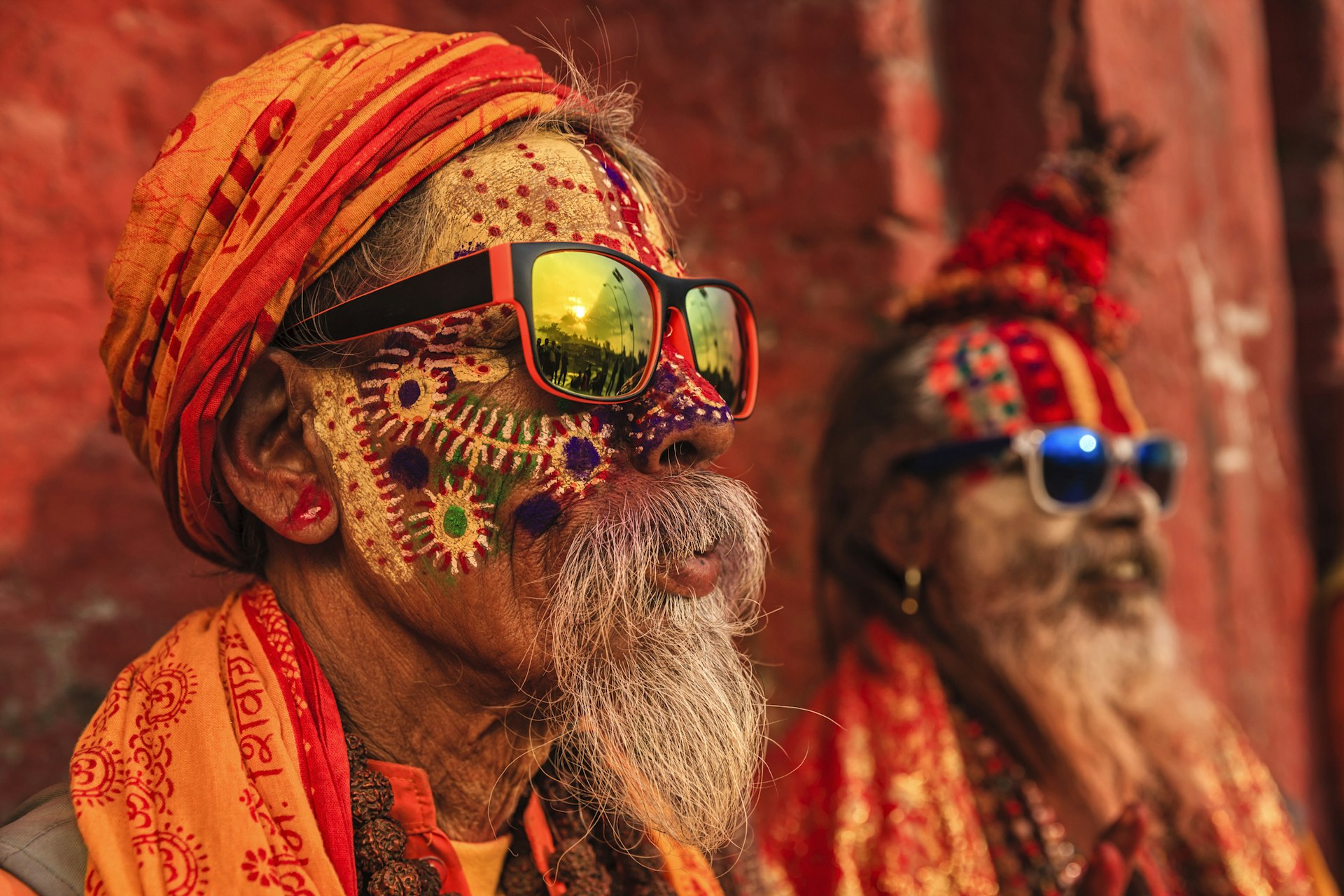
12. Respect etiquette at religious sites
Religion is taken very seriously in India, so it pays to know the rules and expectations for visits to temples, mosques, monasteries, gurdwaras (Sikh shrines), synagogues and churches. Always check if you are allowed to enter – some temples and mosques are closed to people who don’t follow the faith. Mosques may also be closed to visitors during prayers or on Fridays.
If asked to do so, remove your shoes before entering any religious building, and be prepared to cover your head with a scarf or shawl. Generally, always cover your legs and arms (a sarong can be handy as an emergency cover-all). Some temples also ban leather goods, and many religious sites do not allow photography.
Avoid pointing the soles of your feet towards a person or deity – this is considered disrespectful. The same goes for touching any person or effigy on the head. It is conventional to walk around Buddhist and Hindu shrines in a clockwise direction, in a ceremonial circuit known as a parikrama .
Making an offering or leaving a donation is often expected – locals always offer something, but be wary of people waving receipts showing huge donations. Giving something is appropriate, but don’t feel pressured into leaving large sums.
13. Giving alms is common but up to you
The giving of alms has a long history in India, and foreigners can expect to be approached regularly with requests for money. Whether you give or not is a personal choice, but many Indians give on a daily basis, particularly when visiting temples and mosques. Be aware that some requests for money will be scams, and you may be able to do more good by giving your time or cash to charity or aid organizations you’ve taken time to research, rather than handing out cash.
14. Respect local social attitudes
India has complex social rules about respect for elders. Depending on where you are traveling to, older people are often greeted with the honorific “auntie” or “uncle,” and the ending ji may also be added to someone’s name as a sign of respect.
Outside bigger cities, India can be quite conservative when it comes to interactions between unmarried men and women. Also, most parts of India are conservative when it comes to same-sex relationships. Whatever your sexuality, it’s best to avoid public displays of affection.
15. Street harassment is unfortunately common
Although harassment can happen anywhere, parts of India are constantly in the news owing to a lack of women’s safety. Beyond long, unwelcome stares and persistent attempts to start a conversation, more serious assaults are also a risk. Groping is common in crowds (particularly during festivals).
Exercise caution like you would anywhere else, and remain alert. Never get into a taxi or auto rickshaw containing anyone other than the driver, and avoid walking alone in quiet areas, particularly at night. Decline offers of food or drinks from strangers.
If traveling by public transport as a woman, it's best to seek out train carriages and designated seating reserved for women. Wearing a wedding ring (even if not married) and using dark sunglasses and headphones can buy you some privacy on public transport. If you are being hassled, drawing loud attention to the intrusion may encourage others to come to your aid.
16. Keep track of security situations in India
India has seen deadly attacks by separatist and Marxist groups and Kashmiri insurgents. Monitor the local news and be alert for suspicious behavior, particularly around major tourist sites. Always check the security situation before traveling to Srinagar and the Kashmir Valley in case of flare-ups of unrest. Strikes, demonstrations and protests are also best avoided, as violence is a risk. It goes without saying but in the event of trouble, obey local curfews and stay inside – your hotel is probably the safest place to be.
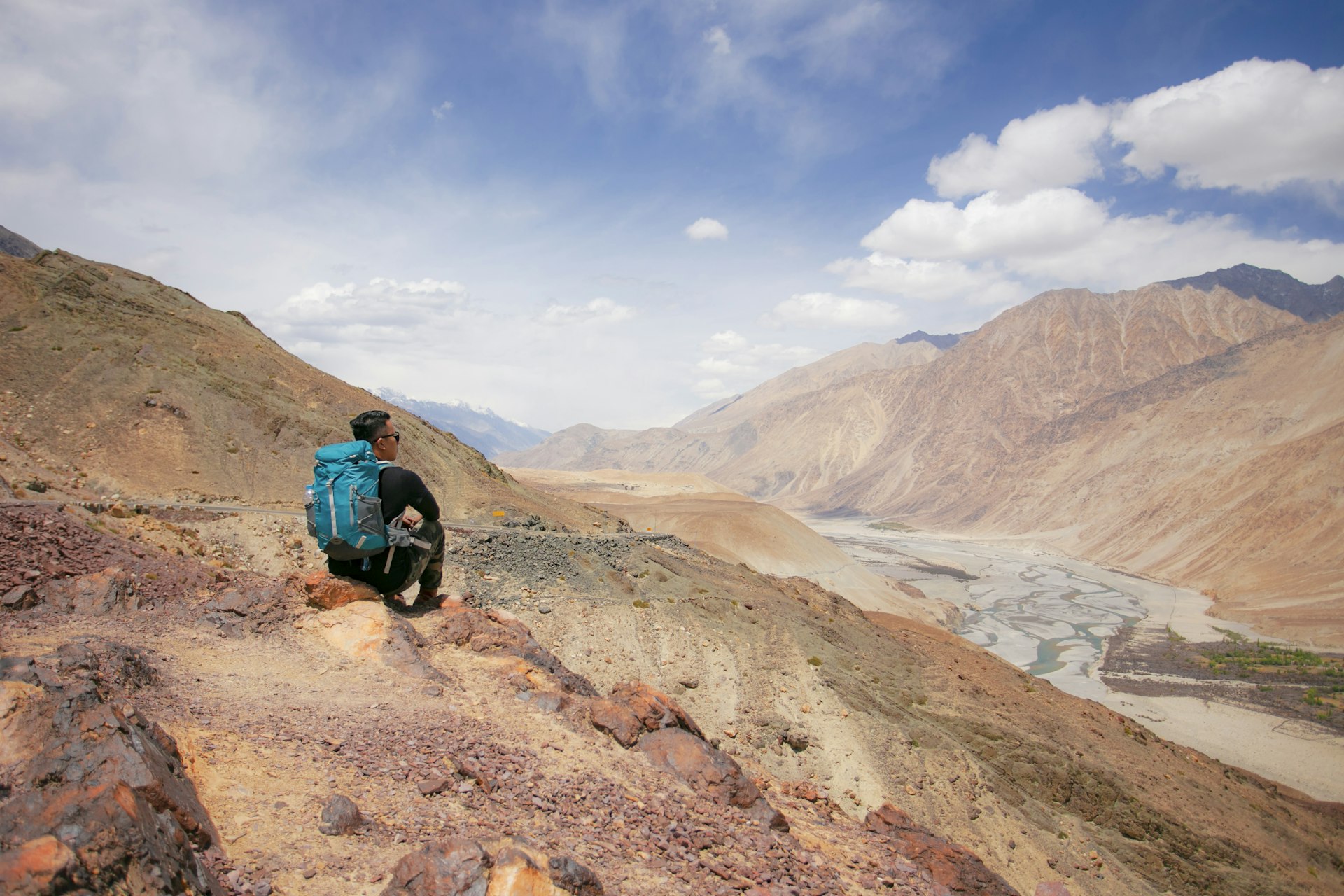
17. Take the altitude seriously when hiking
Acute Mountain Sickness (AMS) is a risk when traveling above 2500m (8202ft), which covers most of the Indian Himalayas . AMS can be fatal, so always ascend slowly and take rest days to allow your body to acclimate to significant elevation changes. If you begin to feel ill while hiking in the mountains, stop, and if your symptoms don’t improve, descend immediately.
18. Familiarize yourself with local rules and regulations
India has a few laws and regulations that visitors might be unfamiliar with. For instance, taking photographs of bridges, the periphery of military camps and border crossings – or flying drones over them – is considered a serious security issue.
When traveling by plane internally in India, you may be asked to surrender batteries from devices in your cabin bags. Smoking is banned in most public places, and a few states also have bans on the consumption of beef – killing or injuring a cow in a road accident, even accidentally, can lead to violent reprisals.
To avoid sticky situations, take the time to research where you’re going, and talk to staff at your hotel or hostel or your B&B host for advice on things to be aware of.
19. Steer clear of drugs
India may have a reputation amongst travelers as a place to push boundaries, but its drug laws are strict. Possessing even small amounts of drugs for personal use can lead to a prison sentence.
Some religious groups are permitted to consume marijuana for ceremonial purposes, but that often doesn’t extend to tourists. You can, however, find bhaang – a marijuana mixture made with the leaves (rather than the bud) of the cannabis plant – at government-approved bhaang shops.
20. Avoid the tap water
The tap water in India is not potable. Drinking or brushing your teeth with it can be a fast track to stomach troubles – the most common illness tourists experience in India. Stick to purified or bottled water (or even better, purify your own to avoid contributing to India’s plastic waste mountain).
The water rule extends to ice (be wary of ice in drinks and ice cream) and to uncooked foods, particularly salads and dishes such as coriander chutneys, which may have been washed with contaminated water. When eating fruit, stick to things you can peel or wash thoroughly yourself, and be cautious of freshly prepared juices. Hot drinks are generally fine, so drink your fill of chai (milky tea, often spiced and sweet).
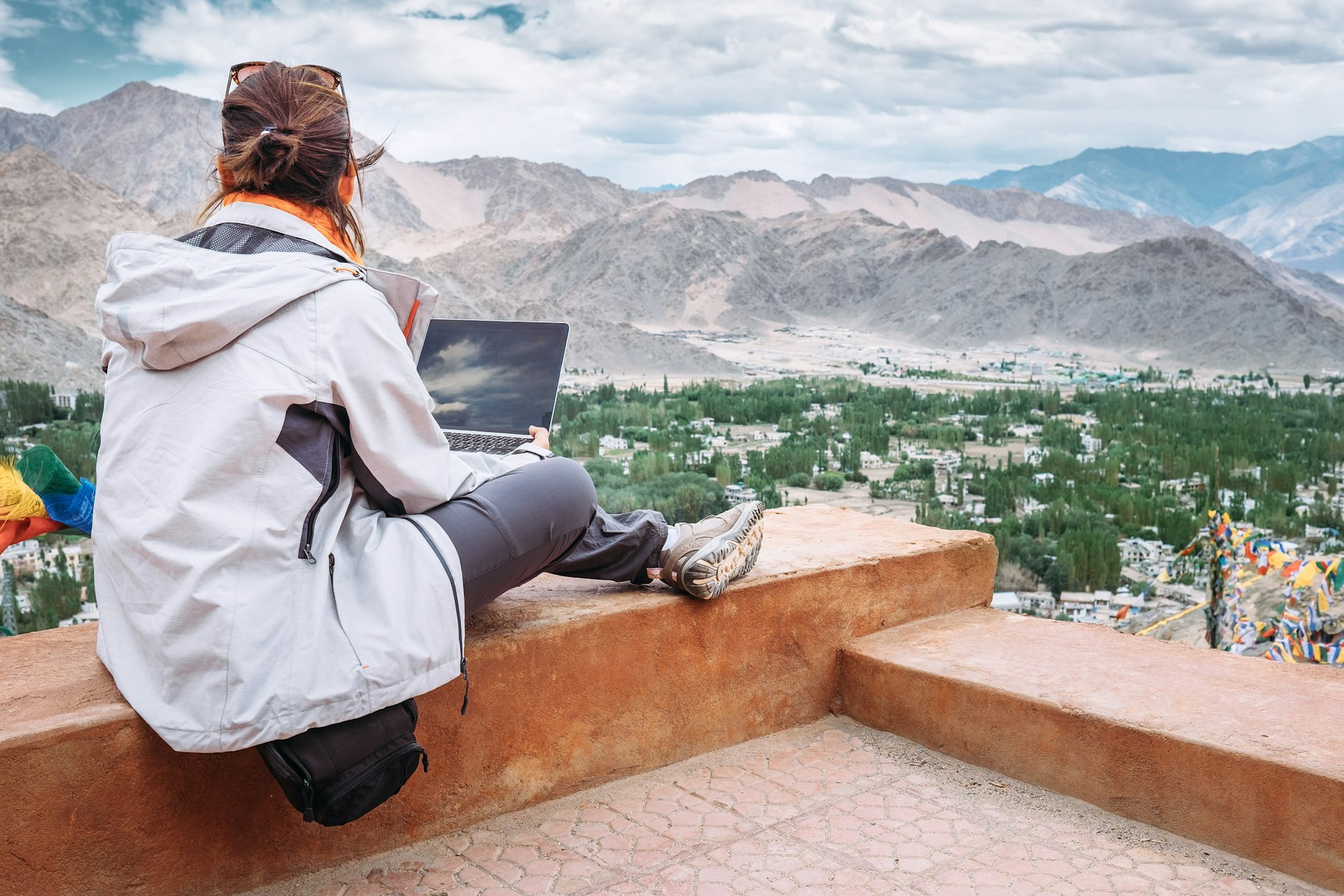
21. Watch local news to keep track of natural disasters
Some geographical areas in India are prone to natural disasters, and the risk is higher in certain seasons. Hilly areas of Himachal Pradesh, for instance, often see flash flooding and landslides during the monsoon. Be alert to signs of natural disasters and keep an eye on the local news so you know which areas to avoid. Follow the Indian Meteorological Department’s website as well as their social media handle for timely updates.
If you are caught up in a natural disaster, follow the advice of emergency workers and try to leave the area quickly.
22. Spot the scams
India has a reputation for scams designed to separate tourists from their money, and touts and confidence tricksters can often be found where tourists gather. Get tourist information and make bookings at official offices, rather than “tourist offices” you have been led to by people offering unsolicited help.
If anyone steers you to a hotel, shop or other establishment without you asking, they may be angling for a commission, which will be added to the price you pay. Be dubious of claims that the place you want to go is “closed” – always check yourself to be sure.
Exercise common sense and be wary of deals that sound too good to be true – for example, the gem scam, where travelers are tricked into buying worthless gems to “sell at a profit back home.”
This article was first published Mar 19, 2022 and updated Dec 15, 2023.
Explore related stories
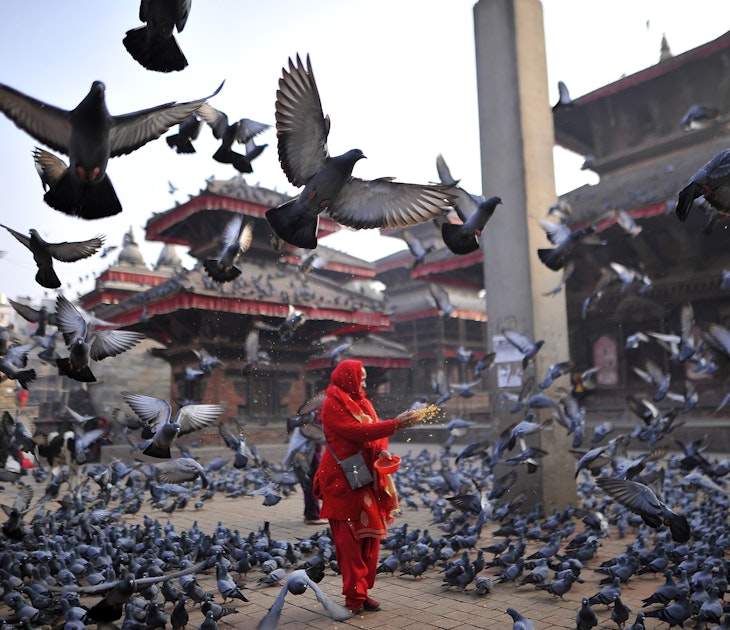
Festivals & Events
May 31, 2024 • 6 min read
Whether you're after mountain adventures or dynamic festivals, timing is a key part of a trip to Nepal. Here's how to choose the best month for your needs.

May 29, 2024 • 8 min read

May 28, 2024 • 9 min read

Jan 11, 2024 • 4 min read

Jan 5, 2024 • 20 min read

Jan 2, 2024 • 8 min read

Dec 27, 2023 • 8 min read

Dec 20, 2023 • 11 min read

Dec 13, 2023 • 7 min read
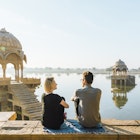
Dec 11, 2023 • 14 min read

An official website of the United States government
Here’s how you know
Official websites use .gov A .gov website belongs to an official government organization in the United States.
Secure .gov websites use HTTPS A lock ( Lock A locked padlock ) or https:// means you’ve safely connected to the .gov website. Share sensitive information only on official, secure websites.
Vaccines for Travelers
Vaccines protect travelers from serious diseases. Depending on where you travel, you may come into contact with diseases that are rare in the United States, like yellow fever. Some vaccines may also be required for you to travel to certain places.
Getting vaccinated will help keep you safe and healthy while you’re traveling. It will also help make sure that you don’t bring any serious diseases home to your family, friends, and community.
On this page, you'll find answers to common questions about vaccines for travelers.
Which vaccines do I need before traveling?
The vaccines you need to get before traveling will depend on few things, including:
- Where you plan to travel . Some countries require proof of vaccination for certain diseases, like yellow fever or polio. And traveling in developing countries and rural areas may bring you into contact with more diseases, which means you might need more vaccines before you visit.
- Your health . If you’re pregnant or have an ongoing illness or weakened immune system, you may need additional vaccines.
- The vaccinations you’ve already had . It’s important to be up to date on your routine vaccinations. While diseases like measles are rare in the United States, they are more common in other countries. Learn more about routine vaccines for specific age groups .
How far in advance should I get vaccinated before traveling?
It’s important to get vaccinated at least 4 to 6 weeks before you travel. This will give the vaccines time to start working, so you’re protected while you’re traveling. It will also usually make sure there’s enough time for you to get vaccines that require more than 1 dose.
Where can I go to get travel vaccines?
Start by finding a:
- Travel clinic
- Health department
- Yellow fever vaccination clinic
Learn more about where you can get vaccines .
What resources can I use to prepare for my trip?
Here are some resources that may come in handy as you’re planning your trip:
- Visit CDC’s travel website to find out which vaccines you may need based on where you plan to travel, what you’ll be doing, and any health conditions you have.
- Download CDC's TravWell app to get recommended vaccines, a checklist to help prepare for travel, and a personalized packing list. You can also use it to store travel documents and keep a record of your medicines and vaccinations.
- Read the current travel notices to learn about any new disease outbreaks in or vaccine recommendations for the areas where you plan to travel.
- Visit the State Department’s website to learn about vaccinations, insurance, and medical emergencies while traveling.
Traveling with a child? Make sure they get the measles vaccine.
Measles is still common in some countries. Getting your child vaccinated will protect them from getting measles — and from bringing it back to the United States where it can spread to others. Learn more about the measles vaccine.
Find out which vaccines you need
CDC’s Adult Vaccine Quiz helps you create a list of vaccines you may need based on your age, health conditions, and more.
Take the quiz now !
Get Immunized
Getting immunized is easy. Vaccines and preventive antibodies are available at the doctor’s office or pharmacies — and are usually covered by insurance.
Find out how to get protected .

Request an appointment
Vaccinations for india.

While there are no compulsory vaccinations for travelling to India, it is essential that travellers recognise that there is a higher risk to their health while travelling within India. These risks are mainly associated with food and water borne diseases but conditions such as rabies, tuberculosis and cholera which are often also present in many regions.
Malaria There is a risk of malaria in the states of Assam and Orissa; the districts of East Godavari, Srikakulam, Vishakhapatnam and Vizianagaram in the state of Andhra Pradesh; and the districts of Balaghat, Dindori, Mandla and Seoni in the state of Madhya Pradesh
All Travellers
Poliomyelitis is a viral disease transmitted through oral/faecal contamination and the respiratory route. The vaccine is combined with cover against Tetanus and Diphtheria. Most travellers who have completed their primary course of childhood vaccines will only require a single booster dose to provide cover . Once completed it is expected that cover should last for 10 years.
Find out more about Poliomyelitis
Tetanus is contracted through contaminated cuts, bites and breaks in the skin. The vaccination provides cover for approximately 10 years in the majority of patients. It is frequently combined with cover against other diseases such as Poliomyelitis , Diphtheria and/or Pertussis .
Find out more about Tetanus
Hepatitis A is a common disease in many of the hotter regions of the world and usually contracted through contaminated food and water. Cover against Hepatitis A can be given alone or combined with protection against Hepatitis B. Once completed, the Hepatitis A vaccination ( given on two occasions 6 to 12 months apart ) provides cover for approximately 25 years in the majority of patients.
Find out more about Hepatitis A
Typhoid is a bacterial disease contracted through contaminated food and water. Once completed, the Typhoid vaccination given on one occasion provides cover for between 2 to 3 years in the majority of patients
Find out more about Typhoid
Hepatitis B is a viral disease which is usually transmitted in a very similar fashion to HIV/AIDS through contact with infected body fluids (eg blood exposure and sexually). This vaccine can be combined with cover against Hepatitis A. The standard schedule for Hepatitis B is to administer the vaccine on days 0, 28 and 180. A more rapid schedule can be used in cases where cover is needed more urgently and this is administered on days 0, 7, 21 to 28 and also 365. Following either course (and not before completion) a blood test can be taken to confirm sufficient antibody protection. Where the correct level of antibodies are showing (>10iu) the vaccination is recognised to provide cover for life .
Find out more about Hepatitis B
Rabies is a viral disease which is usually transmitted through the bite, the lick or the scratch of any infected warm blooded animal. As per the current WHO guidance, the vaccine is usually administered on days 0 and between 7 and 28 . Once a course is completed, the vaccination provides life long ‘immune memory’ in the majority of patients BUT after any possible exposure the individual always needs further vaccination to boost antibody production
Find out more about Rabies
Meningococcal Meningitis is a bacterial disease which is usually transmitted through the respiratory route. The vaccine is given on one occasion and provides cover against four of the main forms of this disease. Once a course is completed the vaccination provides for over 10 years in the majority of patients.
Find out more about Meningococcal Meningitis
Cholera / E coli are both food / water borne diseases. This oral vaccine is given on two occasions between 1 to 6 weeks apart before travel. The second dose (frequently given one week after the initial one) should be administered 7 days before potential exposure . Once completed the cover against Cholera is expected to be for about 2 years . The cover against E coli is shorter and thought to be effective for between 3 to 4 months . In travellers who have completed an initial primary course within the past 2 years a single further dose is sufficient to maintain this cover.
Find out more about Cholera
Japanese Encephalitis is a viral disease transmitted through the bite of an infected mosquito. The Ixiaro vaccine is given on two occasions one month apart with a third dose at 12 months . Once completed the vaccine is thought to provide cover for between 2 to 3 years but possibly longer.
Find out more about Japanese Encephalitis
Most standard tourists travelling to India should start their vaccines four to six weeks before they leave home. However, those planning a longer visit, or where a planned trip is likely to bring them to more rural parts of India, should attend earlier to ensure that there is sufficient time to complete the vaccination courses.
For most Irish travellers safety and security while in India will not be a major concern. However, the experience of road travel through any of the major cities is something many tourists will not forget. Taking care on Indian roads is a constantly essential activity. As in many other countries travelling alone or late at night is unwise.
India is a beautiful country and offers many opportunities for both the Irish tourist and the business traveller.
Cookies on GOV.UK
We use some essential cookies to make this website work.
We’d like to set additional cookies to understand how you use GOV.UK, remember your settings and improve government services.
We also use cookies set by other sites to help us deliver content from their services.
You have accepted additional cookies. You can change your cookie settings at any time.
You have rejected additional cookies. You can change your cookie settings at any time.
Register to vote Register by 18 June to vote in the General Election on 4 July.
- Passports, travel and living abroad
- Travel abroad
- Foreign travel advice
Before you travel check that:
- your destination can provide the healthcare you may need
- you have appropriate travel insurance for local treatment or unexpected medical evacuation
This is particularly important if you have a health condition or are pregnant.
Emergency medical number
Dial 112 and ask for an ambulance.
Contact your insurance or medical assistance company promptly if you’re referred to a medical facility for treatment.
Air pollution
Severe air pollution is a major hazard to public health, especially during the winter months (October to February). North Indian cities are most affected by extremely high levels of pollution. Children, the elderly, and those with pre-existing medical conditions may be especially affected. If you’re pregnant or have a respiratory or heart condition you may wish to consult a medical practitioner before you travel. More information about outdoor air quality is available from TravelHealthPro (from the UK’s National Travel Health Network and Centre).
Mosquito-borne diseases like dengue fever and Chikungunya occur all year round but are more widespread during the monsoon season. More information about disease risk and suggested preparatory measures is available from TravelHealthPro (from the UK’s National Travel Health Network and Centre).
Vaccinations and health risks
At least 8 weeks before your trip check:
- the latest information on health risks and what vaccinations you need for India on TravelHealthPro
- where to get vaccines and whether you have to pay on the NHS travel vaccinations page
Altitude sickness
Altitude sickness is a risk in parts of north and northeast India, including mountainous regions in Himachal Pradesh, Uttarakhand, Ladakh, Sikkim, Arunachal Pradesh, Nagaland, and West Bengal. Certain southern India states, like Kerala and Tamil Nadu, also contain high altitude regions. More information about altitude sickness is available from TravelHealthPro (from the UK’s National Travel Health Network and Centre).
The legal status and regulation of some medicines prescribed or bought in the UK can be different in other countries.
TravelHealthPro explains best practice when travelling with medicines .
The NHS has information on whether you can take your medicine abroad.
For more information, contact the High Commission of India in London or view the Indian Ministry of Health and Family Welfare website and the Indian customs website .
Healthcare facilities in India
Local medical facilities are not comparable to those in the UK, especially in more remote areas. For psychiatric illness, specialised treatment may not be available outside major cities. In major cities, private medical care is available but expensive.
FCDO has a list of English-speaking doctors in India .
COVID-19 Healthcare in India
If you have symptoms of COVID-19 and want more information, contact a registered medical practitioner.
Testing is available on demand from private laboratories. More details on testing labs are available on the Indian Council of Medical Research website .
Travel and mental health
Read FCDO guidance on travel and mental health . There is also guidance on TravelHealthPro .
Transplant surgery
If you’re travelling to India for organ transplant surgery, check in advance with the hospital to find out what proof they need about your circumstances in the UK. You may need to submit evidence of your marriage and birth of your children before the operation can take place. You can get copies of marriage and birth certificates from the General Register Office in the UK. You may want to have them legalised by the FCDO Legalisation office before travelling. The British High Commission cannot provide guarantees and certificates on your behalf.
If you are considering travelling to India for medical treatment, you should:
- read more advice on going abroad for medical treatment and elective surgery
- discuss plans with your UK doctor before going ahead with any medical procedures abroad
- do your own research - private companies have a financial interest in arranging your medical treatment abroad and the information they provide should not be your only source of information
Find further advice on medical tourism from TravelHealthPro , and NHS guidance on going abroad for medical treatment , and (if relevant to you) on cosmetic surgery abroad .
Related content
Is this page useful.
- Yes this page is useful
- No this page is not useful
Help us improve GOV.UK
Don’t include personal or financial information like your National Insurance number or credit card details.
To help us improve GOV.UK, we’d like to know more about your visit today. Please fill in this survey (opens in a new tab) .
Official websites use .gov
A .gov website belongs to an official government organization in the United States.
Secure .gov websites use HTTPS
A lock ( ) or https:// means you've safely connected to the .gov website. Share sensitive information only on official, secure websites.
Get Vaccinated Before You Travel
It’s important to plan ahead to get the shots required for all countries you and your family plan to visit.
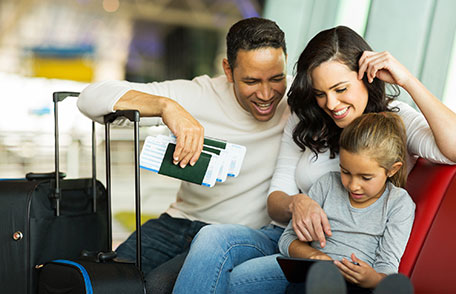
Protect your child and family when traveling in the United States or abroad by:
- Getting the shots required for all countries you and your family plan to visit during your trip
- Making sure you and your family are up-to-date on all routine U.S. vaccines
- Staying informed about travel notices and alerts and how they can affect your family’s travel plans
Avoid getting sick or coming back home and spreading the disease to others.
Vaccinate at least a month before you travel
See your doctor when you start to plan your trip abroad. It’s important to do this well in advance.
- Your body needs time to build up immunity.
- You may need several weeks to get all the doses of the vaccine.
- Your primary doctor may not stock travel vaccines. Visit a travel medical clinic .
- You’ll need time to prepare for your pre-travel appointment .
- If the country you visit requires a yellow fever vaccine , only a limited number of clinics have the vaccine and will probably be some distance from where you live. You must get it at least 10 days before travel.
Find out which vaccines are recommended or required for the countries you plan to visit .
TIP : Save time by getting routine vaccines during the same doctor visit. Use the Vaccine Self-Assessment Tool and discuss the results with your doctor. It tells you which U.S. recommended vaccines you (19 years and older) or your child (birth – 18 years) might need.
Last-minute travelers
When traveling to another country be aware your doctor may not carry a travel vaccine and you may have to visit a medical clinic.
Many travel vaccines require multiple shots or take time to become fully effective. But some multiple-dose vaccines (like hepatitis A) can still give you partial protection after just one dose. Some can also be given on an “accelerated schedule,” meaning doses are given in a shorter period of time.
- Discover and learn about specific diseases that can affect you while traveling
- What to do if you get sick after traveling
- Vaccines & Immunizations
Exit Notification / Disclaimer Policy
- The Centers for Disease Control and Prevention (CDC) cannot attest to the accuracy of a non-federal website.
- Linking to a non-federal website does not constitute an endorsement by CDC or any of its employees of the sponsors or the information and products presented on the website.
- You will be subject to the destination website's privacy policy when you follow the link.
- CDC is not responsible for Section 508 compliance (accessibility) on other federal or private website.
Ubicaciones
Mayo Clinic es conocida en todo el mundo por su atención médica de máxima calidad e investigaciones de vanguardia, y sus sedes principales están en Arizona, Florida y Minnesota.

Mayo Clinic en Arizona Phoenix y Scottsdale: 480-301-4938
- Guía para pacientes y visitas
- Comunícate con nosotros

Mayo Clinic en Florida Jacksonville
- Edificios y mapas

Mayo Clinic en Minnesota Rochester
Ayuda para llegar a las sedes de mayo clinic.
Planificar el camino a seguir para cuidar de la salud puede resultar estresante. Déjanos ayudarte.
Servicios para pacientes extranjeros
Nuestro compromiso con el cuidado de la salud no tiene fronteras.

Mayo Clinic Healthcare Londres, Reino Unido
- Visite nuestro sitio web

Red regional Sistema de Salud de Mayo Clinic
Nuestra red de clínicas, hospitales y centros de atención médica presta servicio en las comunidades de Minnesota, la zona occidental de Wisconsin y la zona norte de Iowa.
Tu donación es muy poderosa... ¿quieres hacerla hoy mismo?
¿Te gustaría hacer una donación deducible de impuestos y ser parte de una investigación de vanguardia y de una atención médica que transforma la medicina?
You are using an outdated browser. Upgrade your browser today or install Google Chrome Frame to better experience this site.
India Healthy Travel Packing List
Remind your patients to pack health and safety items.
Prescription medicines
- Your prescriptions
- Travelers' diarrhea antibiotic
- Suture/syringe kit Kit is for use by local health care provider & requires a letter from your doctor on letterhead stationery
- Altitude sickness medicine
- Medicine to prevent malaria
Medical supplies
- Glasses Consider packing spare glasses in case yours are damaged
- Contact lenses Consider packing spare contacts in case yours are damaged
- Needles or syringes (for diabetes, for example) Requires a letter from your doctor on letterhead stationery
- Suture kit Kit is for use by local health care provider & requires a letter from your doctor on letterhead stationery
- Diabetes testing supplies
- Epinephrine auto-injectors (EpiPens)
- Medical alert bracelet or necklace
Over-the-counter medicines
- Antihistamine
- Motion sickness medicine
- Cough drops
- Cough suppression/expectorant
- Decongestant
- Medicine for pain and fever Examples: acetaminophen, aspirin, or ibuprofen
- Mild laxative
- Mild sedative or other sleep aid
- Saline nose spray
Supplies to prevent illness or injury
- Hand sanitizer or wipes Alcohol-based hand sanitizer containing at least 60% alcohol or antibacterial hand wipes
- Water purification tablets See CDC recommendations: Water Disinfection .
- Water purification tablets May be needed if camping or visiting remote areas
- Insect repellent Select an insect repellent based on CDC recommendations: Avoid Bug Bites
- Permethrin Permethrin is insect repellent for clothing. It may be needed if you spend a lot of time outdoors. Clothing can also be treated at home in advance.
- Bed net For protection against insect bites while sleeping
- Sunscreen (SPF 15 or greater) with UVA and UVB protection. See Sun Exposure .
- Sunglasses and hat Wear for additional sun protection. A wide brim hat is preferred.
- Personal safety equipment Examples: child safety seats, bicycle helmets
- Latex condoms
First-aid kit
- 1% hydrocortisone cream
- Antifungal ointments
- Antibacterial ointments
- Antiseptic wound cleanser
- Aloe gel For sunburns
- Insect bite treatment Anti-itch gel or cream
- Bandages Multiple sizes, gauze, and adhesive tape
- Moleskin or molefoam for blisters
- Elastic/compression bandage wrap For sprains and strains
- Disposable gloves
- Digital thermometer
- Scissors and safety pins
- Cotton swabs (Q-Tips)
- Oral rehydration salts
- Health insurance documents Health insurance card (your regular plan and/or supplemental travel health insurance plan) and copies of claim forms
- Proof of yellow fever vaccination If required for your trip, take your completed International Certificate of Vaccination or Prophylaxis card or medical waiver
- Copies of all prescriptions Make sure prescriptions include generic names. Bring prescriptions for medicines, eye glasses/contacts, and other medical supplies.
- Family member or close contact remaining in the United States
- Health care provider(s) at home
- Lodging at your destination
- Hospitals or clinics (including emergency services) in your destination
- US embassy or consulate in the destination country or countries
Other Destinations
If you need help finding travel information:
Message & data rates may apply. CDC Privacy Policy
File Formats Help:
- Adobe PDF file
- Microsoft PowerPoint file
- Microsoft Word file
- Microsoft Excel file
- Audio/Video file
- Apple Quicktime file
- RealPlayer file
- Zip Archive file
Exit Notification / Disclaimer Policy
- The Centers for Disease Control and Prevention (CDC) cannot attest to the accuracy of a non-federal website.
- Linking to a non-federal website does not constitute an endorsement by CDC or any of its employees of the sponsors or the information and products presented on the website.
- You will be subject to the destination website's privacy policy when you follow the link.
- CDC is not responsible for Section 508 compliance (accessibility) on other federal or private website.
Hinduja Scion in Swiss Human-Trafficking Trial Says Nanny Was Like a ‘Second Mum’ to Family
- Family accused of working staff up to 18 hours every day
- Hindujas say indictment is a ‘fantasized’ version of events

Namrata Hinduja, left, and Ajay Hinduja, second right, at the courthouse in Geneva on Jan. 15.
The scion of the billionaire Hinduja family rejected allegations he overworked an Indian nanny at his Swiss villa, saying it would’ve been idiotic to do so when she was like a “second mum” to his kids.
Ajay Hinduja was testifying on the first day of the Geneva trial of a branch of one of India’s most prominent families, which stands accused of human trafficking and overworking household staff.
World Health Organization confirms Australia's first human case of H5N1 bird flu likely came from India
The World Health Organization (WHO) has confirmed the child who contracted Australia's first human case of a "severe" subtype of bird flu was likely exposed during a trip to India last month.
The WHO said on Friday, local time, that genetic sequencing showed the avian influenza virus was H5N1 — a strain that circulates in South-East Asia and has been detected in previous human infections and in poultry.
"Although the source of exposure to the virus in this case is currently unknown, the exposure likely occurred in India, where the case had travelled, and where this clade of A(H5N1) viruses has been detected in birds in the past," it said in a statement .
The two-year-old girl from Victoria had travelled to Kolkata in India's state of West Bengal from February 12 to February 19, returning to Australia on March 1, the WHO said.
The child was hospitalised on March 2 and remained there for more than two weeks before making a "full recovery", according to Victoria's health department.
The WHO said, as of May 22, no close family contacts in Australia or India had developed symptoms.
"Additional information provided by the family indicates that the case did not travel outside of Kolkata, India, and did not have any known exposure to sick persons or animals while in India."
Victoria's Chief Health Officer, Clare Looker, had previously said it was unclear how the child had picked up the virus, but noted when humans contracted H5N1, it was usually from exposure to poultry.
"So either visiting poultry farms or live wet markets, which have birds at them, or if they've had a lot of contact with domesticated birds," she said.
"Occasionally, people can also get it from handling the meat or eggs of infected birds.
"We couldn't identify a clear event that led to this child's infection, but we suspect it's one of those things."
Amesh Adalja, an infectious disease expert at the Johns Hopkins Center for Health Security, said while it would be difficult to do months after the fact, an investigation was needed to see if the child was in contact with poultry or other birds.
"H5N1 viruses do not transmit efficiently between humans and I suspect there's an occult animal exposure that led to the infection," Dr Adalja said.
WHO advises against travel restrictions
The WHO said human infection of H5N1 can cause "severe disease" and has "a high mortality rate".
From 2003 to 2023, a total of 246 cases of human infection with H5N1 have been reported from four countries within the western Pacific region, according to the WHO. Of these cases, 138 were fatal.
"These A(H5N1) influenza viruses, belonging to different genetic groups, do not easily infect humans, and human-to-human transmission thus far appears unusual," the WHO said.
"As the virus continues to circulate in poultry, particularly in rural areas, the potential for further sporadic human cases remains."
The organisation advised the public to avoid contact with high-risk environments such as live animal markets and farms, as well as live poultry or surfaces that might be contaminated by poultry droppings.
"WHO advises against implementing travel or trade restrictions based on the current information available on this event," it said.
"WHO does not advise special traveller screening at points of entry or other restrictions due to the current situation of influenza viruses at the human-animal interface."
It said any person who had exposure to potentially infected animals or contaminated environments, and who felt unwell, should seek health care promptly and limit exposure to others.
Editor's note (08/06/2024): This story was updated to give the correct location of Kolkata in the Indian state of West Bengal, not in western India.
ABC/Reuters
- X (formerly Twitter)
Related Stories
Two different strains of bird flu have been detected in victoria. what do we know.
First human case of bird flu strain dies in Mexico, WHO confirms
First ever human case of H5N1 bird flu detected in Victorian child returning to Australia
- Avian Influenza
- Diseases and Disorders
- Government and Politics
The Economic Times daily newspaper is available online now.
Upsc cse 2024: exam day arrives for lakhs of aspiring officers; here's all you need to know.
The Union Public Service Commission (UPSC) will conduct the Civil Services (Preliminary) Examination 2024 on June 16 across various exam centres in India. This exam is the first of three stages in the selection process for officers of the Indian Administrative Service (IAS), Indian Foreign Service (IFS), Indian Police Service (IPS), among others. Several arrangements have been made for the smooth travel of candidates to exam centres, including special train and bus services. Candidates must follow key instructions, such as entering exam halls on time and using only a black ballpoint pen to fill the answer key.
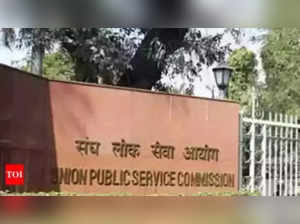
UPSC CSE 2024: Civil services prelim exam tomorrow: Admit card, exam rules, and other details

UPSC exam: Delhi Metro Phase-III services to start at 6 am on June 16

NEET 2024: NTA issues notification on re-exam. Check exam and result dates and other details

UGC NET 2024 exam admit cards released by NTA: How to download, direct link, and other details
Read More News on

Gaming wars: WinZO takes Kavin Mittal’s Hike to arbitration for IP breach, poaching

Saving Private Pawan #2: How PTC twins used INR1 crore to save top brass from Sebi, RBI

Domino effect: Here’s what sent markets into a tailspin on poll results day

Why the UK paid just INR100 stamp duty buying an INR101 crore Mumbai property

5 ingredients in Mamata Banerjee’s Bengal magic potion

7 software stocks with upside potential of upto 32%
Find this comment offensive?
Choose your reason below and click on the Report button. This will alert our moderators to take action
Reason for reporting:
Your Reason has been Reported to the admin.

To post this comment you must
Log In/Connect with:
Fill in your details:
Will be displayed
Will not be displayed
Share this Comment:
Uh-oh this is an exclusive story available for selected readers only..
Worry not. You’re just a step away.

Prime Account Detected!
It seems like you're already an ETPrime member with
Login using your ET Prime credentials to enjoy all member benefits
Log out of your current logged-in account and log in again using your ET Prime credentials to enjoy all member benefits.
To read full story, subscribe to ET Prime
₹34 per week
Billed annually at ₹2499 ₹1749
Super Saver Sale - Flat 30% Off
On ET Prime Membership
Unlock this story and enjoy all members-only benefits.
Offer Exclusively For You
Save up to Rs. 700/-
ON ET PRIME MEMBERSHIP
Get 1 Year Free
With 1 and 2-Year ET prime membership
Get Flat 40% Off
Then ₹ 1749 for 1 year
ET Prime at ₹ 49 for 1 month
Summer Saving Deal
Get flat 20% off on ETPrime
90 Days Prime access worth Rs999 unlocked for you

Exclusive Economic Times Stories, Editorials & Expert opinion across 20+ sectors
Stock analysis. Market Research. Industry Trends on 4000+ Stocks
Get 1 Year Complimentary Subscription of TOI+ worth Rs.799/-
Stories you might be interested in

IMAGES
VIDEO
COMMENTS
Passport Health - Travel Vaccines for India. Overall rating: 5 stars - 10 reviews. . ★★★★★. "Customized Service". "My customized booklet for travel to India was waiting for me upon arrival. All medication options were discussed and I was able to make informed decisions. I received a shot on-site.". Submitted by: Kent.
All international travelers should be fully vaccinated against measles with the measles-mumps-rubella (MMR) vaccine, including an early dose for infants 6-11 months, according to CDC's measles vaccination recommendations for international travel. Dogs infected with rabies are commonly found in India.
Specific. Advice. Travellers'. Diarrhea Kits. Available. The Taj Mahal, Hampi, the Himalayans and the Caves of Ajanta are just the beginning for amazing sights in India. For thousands of years, the subcontinent has been the cradle of one of the most amazing cultures to visit. Every year, tourists from around the globe flock to India to see ...
Travel Medicine Clinics. If you want to see a travel medicine specialist, the International Society of Travel Medicine (ISTM) can help you find a clinic. Directory of travel clinics. Yellow Fever Vaccination. If you need yellow fever vaccine you must get vaccinated at an authorized yellow fever vaccine clinic. Many of these clinics also give ...
The malaria risk in India differs between regions.The areas with the highest risk of malaria include the states of Assam and Orissa, some north-eastern districts in the state of Andhra Pradesh, and some south-eastern districts in the state of Madhya Pradesh. ... You should visit a travel clinic 6 - 8 weeks before your trip to ensure that you ...
International Travellers can book an appointment with Institute of Preventive Medicine for vaccination for yellow fever, MMR, meningitis, etc. through online Vaccination Appointment for International Travellers (VAIT) system. Users can register for appointment, check status of appointment, check appointment details report and cancel appointments.
Learn which vaccines are recommended and required for travel. ... visit CDC's Find a Clinic page. If yellow fever vaccine is recommended or required for your destination, you'll need to go to a vaccine center authorized to give yellow fever vaccinations. Many yellow fever vaccine centers also provide other pre-travel health care services.
Malaria. There is a risk of malaria in some areas for all travellers to India. Certain travellers are at an increased risk in other areas of India which includes those who are pregnant, long stay travellers, the elderly and those with certain medical conditions. For other parts of India including Goa, bite avoidance measures are recommended.
Our Travel Vaccinations & Health Advice service includes a Malaria Prevention service 35 which is designed to help protect you and your family wherever your wanderlust takes you. A travel health appointment is needed before vaccinations or medicines are provided so you should visit a Boots pharmacy ideally 6-8 weeks before your departure.
Personal and travel-related advice. Depending on your travel conditions, route and activities, the advice below may apply. Our nurse will advise on this during the vaccination consultation. Vaccination against yellow fever may be compulsory. Vaccination against dengue . Vaccination against hepatitis B . Vaccination against Japanese encephalitis.
Vaccines for India. Here are vaccines you may need for travel to India: Hepatitis A. This disease can be transmitted through food and water. The risk for Hepatitis A in India is high. So ...
Travel clinics. Many mid-size and large health systems have infectious disease teams with expertise in non-routine travel vaccinations. They stock and administer those vaccines through a travel ...
Essentials you don't want to be without. We've got you covered. Travel safely with our TSA-approved items. At-home COVID-19 tests. Travel-sized toiletries. Shop all travel items. Walgreens can help you prepare for your next adventure. Talk to a pharmacist to find out what vaccines, prescriptions and OTC medicines you need for your trip.
Don't travel to India to obtain restitution after losing money to a scam. Overseas fraud. ... Consult a health care professional or visit a travel health clinic before travelling to discuss your options. It is recommended to do this 6 weeks before travel, however, it is still a good idea any time before leaving. ...
Travel insurance is essential for India. Depending on where you travel to, you may find public hospitals are poorly equipped. Additionally, most private clinics and hospitals require payment ahead of treatment. Make sure you are covered for emergency evacuation and also for any adventure activities you plan to get involved in.
Vaccines for Travelers. Vaccines protect travelers from serious diseases. Depending on where you travel, you may come into contact with diseases that are rare in the United States, like yellow fever. Some vaccines may also be required for you to travel to certain places. Getting vaccinated will help keep you safe and healthy while you're ...
Hepatitis B. Rabies. Meningococcal Meningitis. Cholera. Japanese Encephalitis. Most standard tourists travelling to India should start their vaccines four to six weeks before they leave home. However, those planning a longer visit, or where a planned trip is likely to bring them to more rural parts of India, should attend earlier to ensure that ...
TravelHealthPro explains best practice when travelling with medicines. The NHS has information on whether you can take your medicine abroad. For more information, contact the High Commission of ...
Before international travel, make sure the following people are immunized against measles: Babies 6 months through 11 months of age should have 1 dose of measles vaccine. Children 12 months of age or older should have 2 doses separated by at least 28 days. Unvaccinated adolescents and adults should get 2 doses separated by at least 28 days.
Your primary doctor may not stock travel vaccines. Visit a travel medical clinic. You'll need time to prepare for your pre-travel appointment. If the country you visit requires a yellow fever vaccine, only a limited number of clinics have the vaccine and will probably be some distance from where you live. You must get it at least 10 days ...
Highlights. Learn about CDC's Traveler Genomic Surveillance Program that detects new COVID-19 variants entering the country. Sign up to get travel notices, clinical updates, & healthy travel tips. CDC Travelers' Health Branch provides updated travel information, notices, and vaccine requirements to inform international travelers and provide ...
These hormones travel to the sex organs (ovaries and testes), triggering them to begin releasing sex hormones (estrogen and testosterone). These messenger hormones cause the telltale signs of puberty to begin. ... A note from Cleveland Clinic. Puberty can be a very exciting but challenging time in your child's life. Along with physical ...
Mayo Clinic tiene clínicas y hospitales en Arizona, Florida, Minnesota y la zona norte del Medio Oeste, así como en otros países. Para acceso a contenido. Atención médica en Mayo Clinic. Atención médica centrada en el paciente. Información sobre Mayo Clinic. Pedir una cita.
India's consumer price inflation eased a tad from 4.83% in April to a one-year low of 4.75% in May, but food price rise remained unchanged at 8.7%, with urban households facing a sharper 8.83% ...
India Healthy Travel Packing List. Pack items for your health and safety. You may not be able to purchase and pack all of these items, and some may not be relevant to you and your travel plans. ... Hospitals or clinics (including emergency services) in your destination; US embassy or consulate in the destination country or countries; Top.
Listen. 3:04. The scion of the billionaire Hinduja family rejected allegations he overworked an Indian nanny at his Swiss villa, saying it would've been idiotic to do so when she was like a ...
The World Health Organization (WHO) has confirmed the child who contracted Australia's first human case of a "severe" subtype of bird flu was likely exposed during a trip to India last month.
The Union Public Service Commission (UPSC) will conduct the Civil Services (Preliminary) Examination 2024 on June 16 across various exam centres in India. This exam is the first of three stages in the selection process for officers of the Indian Administrative Service (IAS), Indian Foreign Service (IFS), Indian Police Service (IPS), among others. Several arrangements have been made for the ...